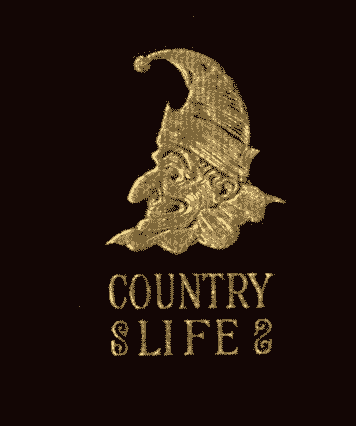
Title: Mr. Punch's Country Life: Humours of Our Rustics
Editor: J. A. Hammerton
Release date: December 16, 2010 [eBook #34676]
Language: English
Credits: Produced by Neville Allen, David Edwards and the Online
Distributed Proofreading Team at http://www.pgdp.net (This
file was produced from images generously made available
by The Internet Archive)
Designed to provide in a series of volumes, each complete in itself, the cream of our national humour, contributed by the masters of comic draughtsmanship and the leading wits of the age to "Punch," from its beginning in 1841 to the present day.

Brown's Country House.—Brown (who takes a friend home to see his new purchase, and strikes a light to show it). "Confound it, the beastly thing's stopped!"
Than the compilation of such a series of books as that which includes the present volume there could surely be no more engaging occupation for one who delights to look on the humorous side of life. The editor feels that if his readers derive as much enjoyment from the result of his labours as these labours have afforded him he may reasonably congratulate them! He has found himself many times over, as a book has taken shape from his gatherings in the treasure house of Mr. Punch, saying "This is the best of the lot"—and usually he has been right. There is none but is "the best!" There may be one that is not quite so good as the other twenty-four; but wild horses would not drag the name of that one from the editor. He feels, however, that in illustrating the humours of country life Mr. Punch has risen to the very summit of his genius. There is, of course, good reason for this, as it is notorious that the richest humour is to be found in the lowly[Pg 6] walks of life, and flourishes chiefly in rustic places where folks are simple and character has been allowed to grow with something of that individuality we find in the untouched products of Nature. Your true humorist has always been in quick sympathy with the humblest of his fellow men. In the village worthy, in poor blundering Hodge, in the rough but kindly country doctor, the picturesque tramp, the droning country parson, the inept curate, the village glee singers, and such like familiar figures of rural England, the humorist has never failed to find that "source of innocent merriment" he might seek for vainly in more exalted ranks of our complex society. But he seeks among the country folk because his heart is there. The very best of Mr. Punch's humorists of the pencil, Charles Keene and Phil May in the past, and Mr. Raven-Hill and Mr. C. E. Brock to-day, have given more consideration to the country ways of life than to any other, and hence the exceeding richness of the present volume. It is thus in no sense a comic picture of Mr. Punch's notions of how the so-called country life is attempted by the townsman—one of the most notable features of our present social conditions—but is, in effect, a refreshing breath of genuine rustic humour, kindly, whole-hearted, and "racy of the soil."
The Connoisseurs.—Groom. "Whew's Beer do you like best—this 'ere hom'brewed o' Fisk's, or that there ale they gives yer at the White Ho's'?"
Keeper (critically). "Well, o' the tew I prefers this 'ere. That there o' Wum'oods's don't fare to me to taste o' nawthun at all. Now this 'ere dew taste o' the cask!!"
| apple | Discord. |
| Pear | Marriage. |
| Plum | Wealth. |
| Pine | Languishment. |
| Gooseberry | Simplicity. |
| Medlar | Interference. |
| Service | Assistance. |
| Elder-berry | Seniority. |
| Fig | Defiance. |
| Sloe | Tardiness. |
| Crab | Sour Temper. |
| Date | Chronology. |
| Hip | Applause. |
| Haw | Swells. |
| Plaintain | Growth. |
| Pomegranate | Seediness. |
| Prune | Retrenchment. |

Land and Water.—Prospective Purchaser (arrived from town to see the locality as advertised some three weeks ago. He has not heard of the recent floods in this part of the country). "Look here. Are you selling this property by the yard or by the pint?"
A Country Sell.—Native Joker (dissembling). It's been very fine here for the last week.
Tourist (who has been kept in by the showers, indignantly). What's been very fine here?
Native. The rain. Very fine rain.
[Exit Native Joker, hurriedly.
"The Best of It."—First Gentleman Farmer. "Why, there goes that artful rogue, Billy Giles! Is he at his old tricks still?"
Second Ditto. "He has cheated everybody down about here, sir, except me! He tried it on this winter, but I was too clever for him! Sold me a cow, and—(triumphantly)—I made him take it back at half-price!!"
Prosperity's fled from our gardens and grounds;
How spindly our bines and how scanty our crops!
Wealth may be "advancing by leaps and by bounds,"
It certainly isn't by hops!

Curate (who wishes to encourage local industry). "Well, Adams, how are you getting on with my watch?"
Adams. "Why, it be nigh finished now, zur, an' 'e do zeem to go mortal well, but dang me, if there bain't a wheel as I can't find a place vor summow!"
"I'm sorry to hear you've been ailing again, John. I must send you down something from the Rectory. How would you like some soup?"
"Thanky kindly, mum—but I bain't so terr'ble wrapped up in soup!"

Doctor. "Well, you got those leeches I sent for your husband, Mrs. Giles?"
Mrs. Giles. "Yes, zur; but what on earth be the good o' sending they little things vor a girt big chap like he? I jes' took an' clapped a ferret on 'un!"

Hotel-keeper (who has let his "Assembly Room" for a concert). "Well, sir, I 'ope you found the arrangements in the 'all satisfactory last night?"
Mr. Bawlington. "Oh, yes; everything was all right. There was only one thing to object to. I found the acoustics of the building not quite——"
Hotel-keeper. "No, sir; excuse me. What you smelt was the stables next door!"

Giles. "I be got up here, mister, but I don't zee 'ow ever I be goin' to get down."
Farmer. "Thee zhut thee eyes an' walk about a bit, an' thee'll zoon get down!"
An Old Offender.—Country Gentleman (eyeing his Gardener suspiciously). "Dear, dear me, Jeffries, this is too bad! After what I said to you yesterday, I didn't think to find you——"
Gardener. "You can't shay—(hic)—I wash drunk yesht'day, sh——!"
Country Gentleman (sternly). "Are you sober this morning, sir?"
Gardener. "I'm—shlightly shober, shir!!"

Qualified Admiration.—Country Vicar. "Well, John, what do you think of London?" Yokel. "Lor' bless yer, sir, it'll be a fine place when it's finished!"

Squire's Daughter. "Do you think it is quite healthy to keep your pigs so close to the cottage?"
Hodge. "I dunno, miss. Noan of they pigs ain't ever been ill!"

Farmer's Wife (whose beer is of the smallest). "Why, you hevn't drunk half of it, Mas'r Gearge!"
Peasant (politely). "Thanky', mu'm—all the same, mu'm. But I bean't so thusty as I thought I wor, mu'm!!"

Nephew (on a visit to the "Old Country"). "Ah, uncle, in Canada we don't do our hay-makin' in this 'ere old-fashioned way."
Uncle. "Why, you bean't never goin' to tell I as you've bin an' turned teetotal?"
Reciprocity.—Parson. "I have missed you from your pew of late, Mr. Stubbings——"
Farmer (apologetically). "Well, sir, I hev' been to meet'n' lately, but—y' see, sir, the Reverend Mr. Scowles o' the chapel, he bought some pigs o' me, and I thought I ought to gi' 'm a tarn!"

Doctor. "Well, Mrs. Muggeridge, how are you getting on? Taken the medicine, eh?" Mrs. M. "Yes, doctor. I've taken all the tabloids you sent, and now I want a new persecution."
On a Footing.—Almost every considerable town has a market for corn; therefore, it is but fit that Bedford Market-place should have its Bunyan.
Soundings!—(The living down at our village falling vacant, Lord Pavondale left it to the parish to choose the new rector.)
Influential Parishioner. "Then am I to understand, Mr. Maniple, that you object to bury a Dissenter?"
The Rev. Mr. Maniple (one of the competitors). "Oh, dear me, no, Mr. Jinks; quite the contrary!"
Visitor. "My good man, you keep your pigs much too near the house."
Cottager. "That's just what the doctor said, mum. But I don't see how it's agoin' to hurt 'em!"
January.—Buy a house in the Midland Counties. Put a housekeeper in it to look after it.
February.—Housekeeper writes to say that, owing to the floods, the neighbourhood is very damp and unhealthy.
March.—Housekeeper writes to say that the garden is under water.
April.—Housekeeper writes to say that there is two foot of water in the drawing-room, and that the furniture is floating about.
May.—Housekeeper writes to say that eighty feet of the garden wall has been washed away.
June.—Housekeeper writes to say that the two horses, one cow, and four pigs are drowned.
July.—Go and stop in the house myself.
August.—Escape from the bedroom windows in a boat.
September.—In bed with rheumatic fever.
October.—Housekeeper writes to say that the floods are out worse than ever.
November.—Somebody writes to say that the housekeeper has been drowned.
December.—Will try and sell house in the Midland Counties.

Our Curate (who is going to describe to us his little holiday in lovely Lucerne). "My dear friends—I will not call you 'ladies and gentlemen,' since I know you too well——"
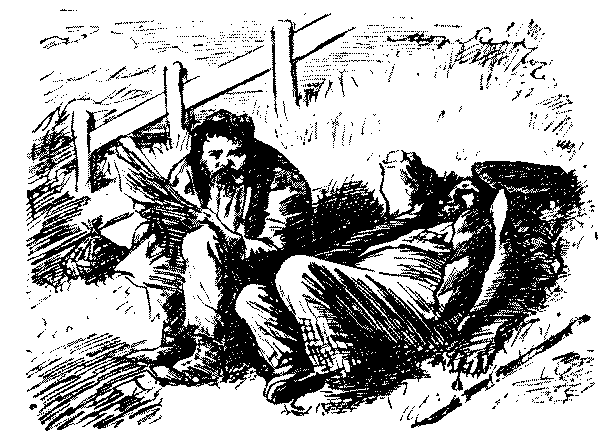
First Tramp. "Says in this 'ere paper as 'ow some of them millionaires works eight and ten hours a day, Bill."
The Philosopher. "Ah, it's a 'ard world for some poor blokes!"
A Real Convert.—Local Preacher (giving an account to the vicar of the parish of a dispute he has had with the leading lights of his sect). "Yes, sir, after treatment the likes o' that, I says to 'em, 'For the future,' says I, 'I chucks up all religion, and I goes to Church!'"

The Humours of House Hunting.—Lady. "Very healthy place, is it? Have you any idea what the death-rate is here?" Caretaker. "Well, mum, I can't 'xactly zay; but it's about one apiece all round."

The Vicar's Daughter. "I'm glad to find you've turned over a new leaf, Muggles, and don't waste your money at the public-house."
Muggles. "Yes, miss, I have it in by the barrel now, and that do come cheaper!"
Oh, to be in London now that April's there,
And whoever walks in London sees, some morning in the square,
That the upper thousands have come to town,
To the plane-trees droll in their new bark gown,
While the sparrows chirp, and the cats miaow
In London—now!
And after April, when May follows
And the black-coats come and go like swallows!
Mark, where yon fairy blossom in the Row
Leans to the rails, and canters on in clover,
Blushing and drooping, with her head bent low!
That's the wise child: she makes him ask twice over,
Lest he should think she views with too much rapture
Her first fine wealthy capture!
But,—though her path looks smooth, and though, alack!
All will be gay, till Time has painted black
The Marigold, her mother's chosen flower,—
Far brighter is my Heartsease, Love's own dower.
Mrs. Ramsbotham is staying with her niece in the country. She is much delighted with the rich colour of the spring bulbs, and says she at last understands the meaning of "as rich as Crocus."
| Marshal Niel—Rose | Row-doe-den'd-run. |
| Minion-ate. | Pick-o'-tea. |
| Car-nation. | Dahli-a. |
| Any-money. | Double Pink. |
| Few-shiers. | Glad I-o-la! |
A Conundrum to fill up a Gap in the Conversation.—Why is a person older than yourself like food for cattle?
Because he's past your age (pasturage).
Everything comes to the Man who waits.—Country Rector's Wife (engaging man-servant). And can you wait at dinner?
Man. Aw, yes, mum; I'm never that hoongry but I can wait till you've done.

Vicar. "Well, gentlemen, what can I do for you?"
Spokesman. "Please, sir, we be a deputation from farmers down Froglands parish, to ask you to pray for fine weather for t'arvest."
Vicar. "Why don't you ask your own Vicar?"
Spokesman. "Well, sir, we reckon 'e be'unt much good for this 'ere. 'E do be that fond of fishin'."
A Rustic Moralist.—Rector (going his rounds). "An uncommonly fine pig, Mr. Dibbles, I declare!"
Contemplative Villager. "Ah, yes, sir: if we was only, all of us, as fit to die as him, sir!!"
Query.—Has the want of rain this summer, and consequent failure of the hay crops, affected the market for Grass Widows?
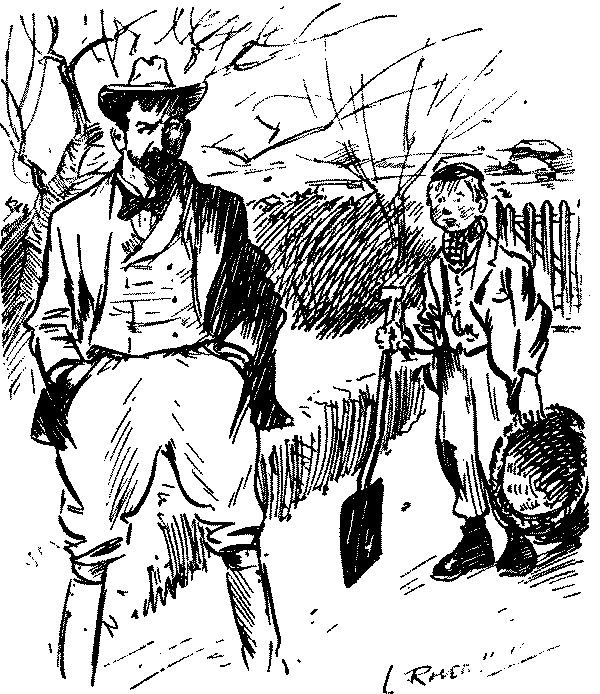
The Boy (to Brown, who has just taken a "little place" in the Country). "Plaze, zur, wot be I to start on?"
Brown. "Oh—er—er—let's see——Oh, confound it!—er—er—make a bonfire!"

A Village Fiasco.—Gifted Amateur (concluding pet card trick). "Now, ladies and gentlemen, you have seen the pack of cards burnt before your eyes, and the ashes placed inside the box, which mysteriously transformed itself into a rabbit, which, in turn, disappeared into space. I will now ask this gentleman to name the card he selected, when it will at once appear in my hand. Now, sir, what card did you select from the pack?" Giles (who has been following the trick most intently). "Blessed if I recollect!"
At Bilston they always hit the right nail on the head.
At Bolton it is impossible for those who run up ticks to bolt off.
At Broadstairs the accommodation for stout visitors is unrivalled.
At Colchester they are all "natives."
At Coventry, strange to say, they can furnish no statistics of the number of persons who have been sent there.
At Kidderminster there is certain to be something fresh on the tapis.
At Liverpool they are extremely orthodocks.
If you write to Newcastle (Staffordshire) take care to under-Lyne the address.
At Newmarket they take particular interest in the question of races.
At Portsmouth everything is ship-shape.
At Rye you will meet none but Rye faces.
At Sheffield you will always find a knife and fork laid for you.
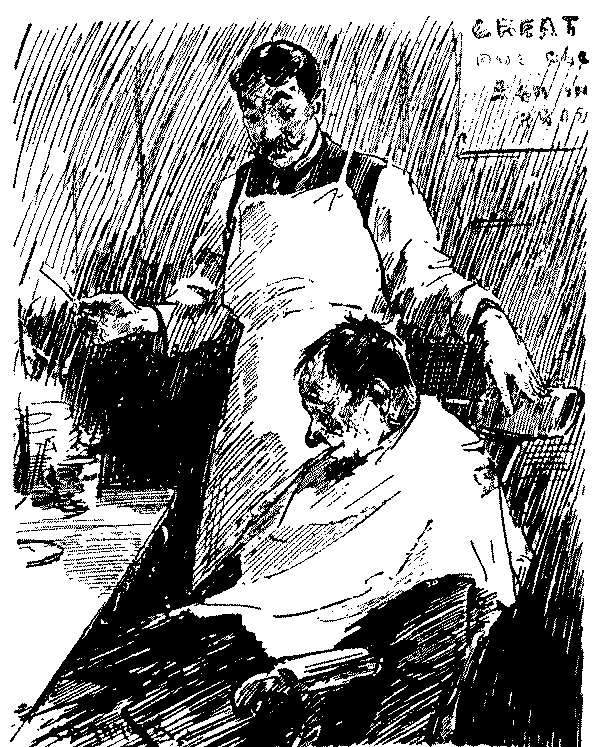
Scene—A Pit Village. Time—Saturday Night.
Barber (to bibulous customer). "Now, sir, if you don't hold your head back, I can't shave you!"
Pitman. "A'well, hinney, just cut me hair!"
What our Architect has to put up with.—Our Architect (Spotting Sixteenth Century gables). "That's an old bit of work, my friend!"
"Oi, sir, yeu be roight, theer, that you be!"
O. A. (keen for local tradition). "You don't know exactly how old, I suppose?"
"Well, noa, sir; but old it be! Whoi, I's knowed it myself these noine years!"
Our Village Industrial Competition.—Husband (just home from the City). "My angel!—crying!—Whatever's the matter?"
Wife. "They've—awarded me—prize medal"—(sobbing)—"f' my sponge cake!"
Husband (soothingly). "And I'm quite sure it deserv——"
Wife (hysterically). "Oh—but—'t said—'twas—for the best specimen—o' concrete!"
Our Choir-master (after lamentable failure on part of Pupil). "Confound it! I thought you said you could 'Read at sight'?"
Pupil. "So I can. But not first sight."
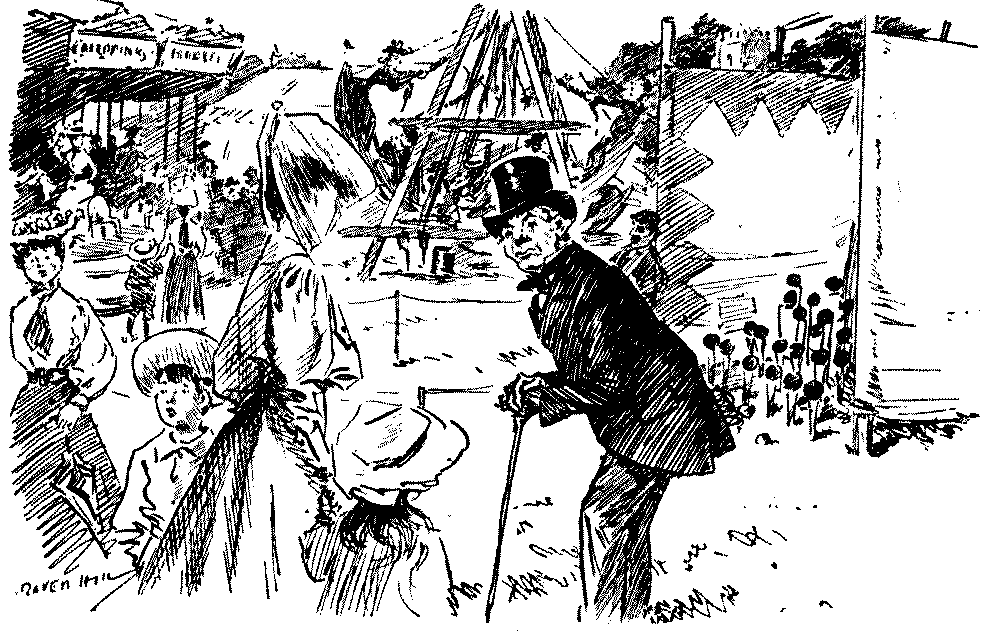
Village Worthy. "It ain't so bad for Slowcombe, mum; but, lor' bless 'ee! 'tain't nothing to what they 'ud do in London!"

Village Doctor. "And what do you intend to make of this little man, Mrs. Brisket?"
Proud Mother. "Butcher, sir. 'E's bound to be a butcher. Why, 'e 's that fond o' animals, we can 'ardly keep 'im out o' the slaughter-'ouse!"

Doctor. "Well, John, how are you to-day?"
John. "Verra bad, verra bad. I wish Providence 'ud 'ave mussy on me an' take me!"
Wife. "'Ow can you expect it to if you won't take the doctor's physic?"

Lodger. "I detect rather a disagreeable smell in the house, Mrs. Jones. Are you sure the drains——"
Welsh Landlady. "Oh, it can't be the drains, sir, whatever. There are none, sir!!"

Yorkshire Farmer (who has laid a wager—to gentleman on weighing machine). "Will ye tell us how mooch ye weigh, mister?"
Gentleman. "Well, I'm seventeen stone seven."
Farmer. "What did a' tell ye, lads? A' couldn't be wrang, for a's t' best joodge o' swine in t' coontry!"
'Tis sweet at Summer eve to rove,
When brightly shines each twinkling star,
And, strolling through the silent grove,
Calmly to smoke a good cigar.
'Tis sweet upon the flowery mead
To see the tender lambkins play,
With pensive eye to watch them feed,
And note how plump to roast are they.
'Tis sweet the fallow deer to view,
Couched 'mid the fern in tranquil group;
'Tis sweet to hear the turtle's coo,
And meditate on turtle soup.
'Tis sweet, from cares domestic free,
While wandering by the streamlet's side,
The speckled trout or perch to see,
And think how nice they would be, fried.
'Tis sweet to mark the plover's flight,
Lone on the moor, its nest despoiled;
And with prospective mental sight
To contemplate its eggs, hard boiled.
'Tis sweet, beside the murmuring rill,
The scented violet to smell;
Yet may a perfume sweeter still
Attend the welcome dinner-bell!
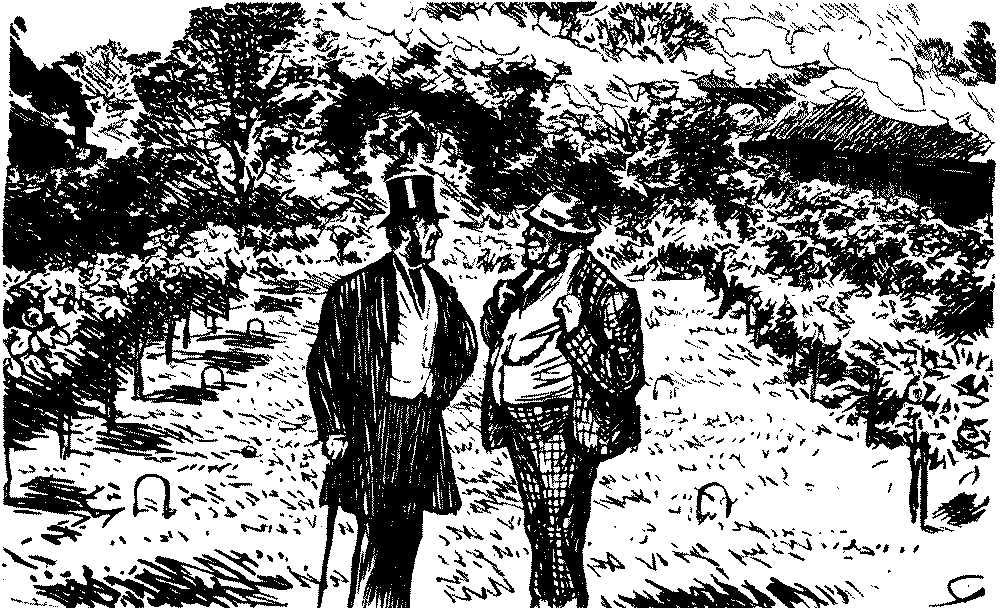
The Country in the Future.—Retired Citizen (to Metropolitan Friend). "What I enjoy so much in the country is the quiet! Now here, in my garden, my boy, you don't hear a sound, 'cepting the trains!!"
Friends in Council.—Tom Lothbury (to Jack Billiter, who has "come in" to a nice little estate in Surrey, whereunto he intends retiring and rusticating). "You'll keep cows, I s'pose, and all that sort of thing?"
Jack. "Oh, no, can't bear milk."
Tom (who has a taste for the rural). "Cocks and hens, then?"
Jack. "No, hate eggs and puddings and all that!"
Tom. "Nor yet sheep?"
Jack. "Eh, ah! Oh, yes; I'll have a sheep, I'm vewy fond of kidneys for bweakfast!"
Simple, but Agricultural.—Q. What is the best time for sowing tares?
A. When the landlord goes round and collects his rents.

Doctor. "Well, Matthew, did you take those pills I sent you yesterday?"
Patient. "Yes, doctor; but couldn't 'e do 'em up in something different? They little boxes be terrible hard to swallow!"
On the way to the Manse.—Deacon MacTavish (to Deacon MacBrose, after visiting several hospitable houses on their way). Hoot, mon Donald, yonder's the Meenister! Noo, I'll joost tek a few paces afore ye, in that ye may say gin my puir tired legs don't tremble.
Deacon MacBrose. Gae forrard, Sandy, gae forrard!
Deacon MacTavish (after stumbling ahead for several yards). Weel, Donald, hoo gae they?
Deacon MacBrose. Richt bonnily, Sandy, richt bonnily. But wha's the mon that's walking beside ye?
From the Mining Districts.—(Young Curate finds a Miner sitting on a gate smoking.)—Curate (desirous to ingratiate himself with one of his flock). A fine morning, my friend.
One of his flock gives the slightest nod, and a grunt, and spits.
Curate (supposing that he had not been heard). A fine morning, my good friend.
One of his flock. Did I say it warn't. Do you want to hargue, you beggar?

Lady. "And you say you have been brought to this by your wife?"
Tramp. "Yuss, lidy. I got 'er three good jobs, and 'er bloomin' independence lorst 'er the lot of 'em!"

Scene—The Hall of a Country House. Guests arriving for dinner.
Perkins (the extra man who is had in to help at most dinners given in the neighbourhood—confidentially but audibly). "Good evening, Miss Waters. There's some of that nice pudding here to-night, what last time you took twice of!"
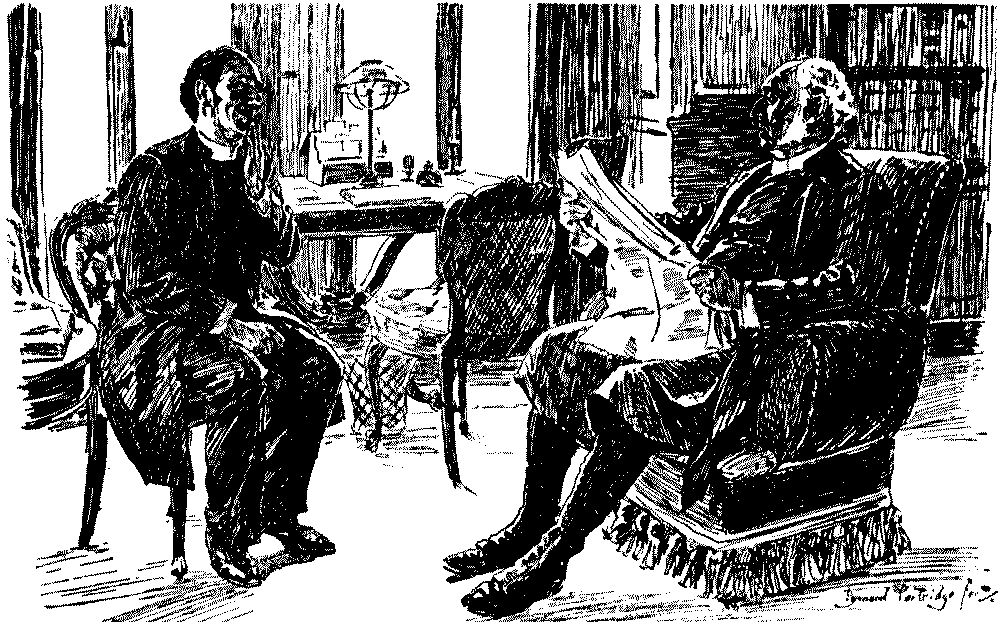
The Bishop of Lichbury. "Really, it's very shocking to read in the papers so many painful cases of wife-beating and assault among the labouring classes!"
The Rev. Mr. Simmiel. "It is indeed, my lord. Indeed—ahem—with your lordship's permission, one might almost call them belabouring classes."

Parson. "Good morning, Mrs. Stubbins. Is your husband at home?"
Mrs. Stubbins. "'E's 'ome, sir; but 'e 's a-bed."
Parson. "How is it he didn't come to church on Sunday? You know we must have our hearts in the right place."
Mrs. Stubbins. "Lor, sir, 'is 'eart's all right. It's 'is trowziz!"
A Poacher's Paradise.—About an hour from town.—Charming bijou residence ... grounds adjoin a large pheasant preserve; owner going abroad.—Advt. in "Standard."

New Curate (who wishes to know all about his parishioners). "Then do I understand you that your aunt is on your father's side, or your mother's?"
Country Lad. "Zometimes one an' zometimes the other, 'ceptin' when feyther whacks 'em both, sir!"

Mr. Spinks. "I had such a beautiful dream last night, Miss Briggs! I thought I was in the Garden of Eden——"
Miss Briggs (with simplicity). "And did Eve appear as she is generally represented, Mr. Spinks?"
Mr. Spinks. "I—I—I—I—didn't look!"

Professional Partnership.—Village Organ-blower (to Lady Organist, who has been trying a new voluntary). "How did it go, marm?" "Oh, all right. Why do you ask?" "Well, marm, to tell you the truth, I was a bit nervous about it. You see, marm, I've never blowed for that piece afore!"
How to Winnow Corn. 1st Method.—Get some corn. Get somebody who knows how to winnow it. Let him do it.
2nd Method.—If you know all about it, do it yourself.
3rd Method, for Beginners, given in Agricultural Terms. Place a steward near the blower, and let him drive the blower while the hopper is filled with a large wecht. (This is called the system of Hopper-ation.) Then let a woman with a small wecht slide down on a wheel crushing the blower with her shoes. This should be done in a neat, cleanly way until the scum has been swept with a besom through a wire screen, while another lot go on riddling, when it is the duty of the fanner to answer each riddle as it comes out. The fanner's chief work is, however, to prevent any labourer becoming too hot. When a labourer is very warm, he sits down before the fanner, who soon restores him to coolness.
Treatment of Fowls in Winter.—Roast them.
For the Volunteer-farmer in Winter.—Attend turnip drills.
How to Pickle Pork.—Get the hog into a proper temperature. To bring this about make him swallow a small thermometer. This'll warm him. Rub him with paper dipped in oil, give him a uniform coating of barley, tar, syrup of squills, pitch, and gold tin-foil. Paint his head green with orange stripes, and by that time he'll be in a pretty pickle.
Breakfast.—Always visit your poultry yard before breakfast. If unable to find a fresh egg, go to the cattle sheds. Remember that, where eggs cannot be obtained, a yoke of fine oxen beaten up with a cup of tea is most invigorating.
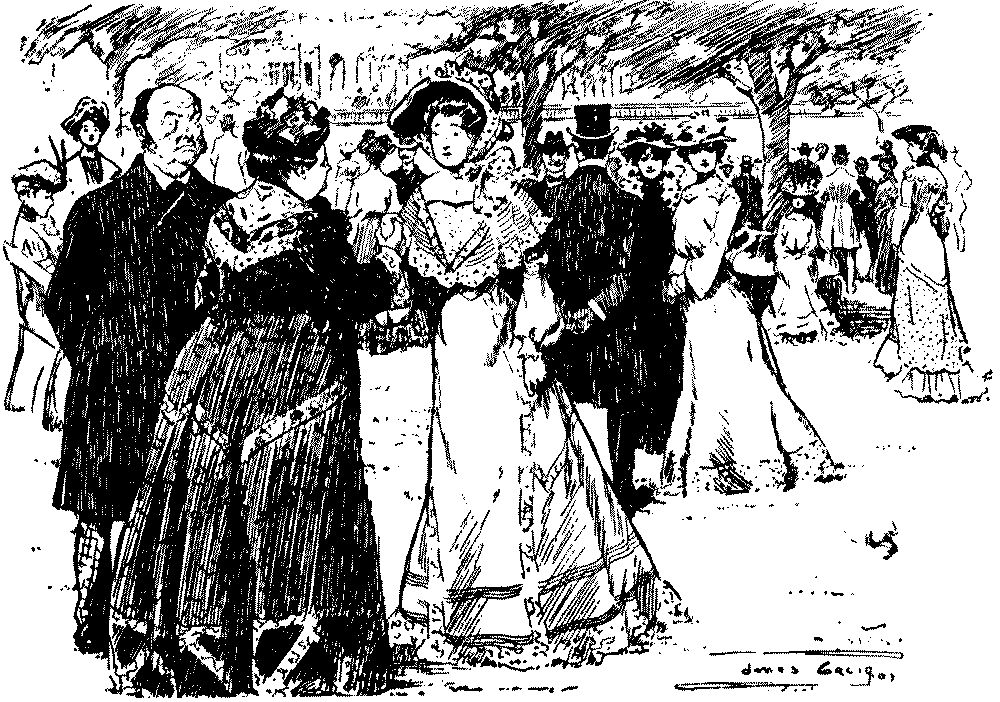
Political Garden Party in the Provinces.—
Great Lady (speeding the parting guest). "So glad you were able to come!"
Mayoress. "Oh, we always try to oblige!"
Agricultural.—A South of England farmer writes to us to say, that he has an early harvest in view, as he has already got three ricks in his neck, and is doing very well.
Further Illustration of the Mining Districts.—
First Polite Native. "Who's 'im, Bill?"
Second ditto. "A stranger!"
First ditto. "'Eave 'arf a brick at 'im".

District Visitor. "Well, Mrs. Hodges, going to have a cup of tea?"
Mrs. Hodges. "Oh no, miss; we're just goin' to 'ave a wash!"

"Well, Johnson, been to the doctor, as I told you?"
"Yes, m'lord."
"And what did he say was the matter with you?"
"'E says it's just general ability, m'lord, that's all!"

Sagacity.—Countryman. "Fi' pounds too much for him? He's a won'erful good sportin' daug, sir! Why, he come to a dead pint in the street, sir, close ag'in a ol' gen'leman, the other day—'fust o' September it was, sir!—an' the gen'leman told me arterwards as his name were 'Partridge'!"
Customer. "You don't say so!" [Bargain struck.
Stimulated by the recent achievements of a horticulturist, who is about to place on the market the "pomato," a blend of the apple and tomato, and the "plumcot," a mixture of plum and apricot, Mr. Punch hopes soon to be able to announce the successful rearing of the following novelties:—
The Cumberry.—This may be regarded either as a very long gooseberry or a very short cucumber, according to fancy. When fully ripe the skin is thin and the contents pulpy. Unripe it is like a cobble, and may be used as such. Mr. Punch is disposed to think that the over-ripe cumberry will be very popular at elections, especially when eggs are scarce. The hairy variety looks like a fat caterpillar, and makes very good grub.
The Mistletato, a happy combination of the romantic and the domestic. This fruit, which has a very piquant flavour, has been grown in a small patch of soil, concealed, like King Charles, among the branches of an oak. Hence it is not surprising that the Mistletato should combine the [Pg 66]nourishing qualities of the homely tuber with the sentimental associations of that plant which was revered by our Druid ancestors and is beloved by modern maidens. It should be a popular dish at wedding breakfasts.
The Pumpkonion promises well and seems likely to combine the amplitude of the pumpkin with the pungency of the onion. Mr. Punch is of opinion that a machine will have to be invented for dealing with this vegetable, as to handle it would be too severe a tax upon the cook's lachrymal glands.
The Turniparrot and the Parsniparagus are not yet sufficiently developed to be described with any confidence. Many others are only in an incipient state at present, but Mr. Punch hopes to be able before long to announce that he has brought several to maturity, including the Collage and the Cabbyflower.

All's Well that Ends Well.—
Stepmother (entering village school with whip). "My boy tells me you broke your cane across his back yesterday?"
Schoolmaster (turning pale). "Well, I—I may have struck harder than I intended, but——."
Stepmother. "I thought I'd make you a present of this whip. You'll find it'll last longer and do him more good!"
A Riddle from Colney Hatch.—Q. Why have we reason to suppose that a bee is a rook?
A. Because.

Priest. "Wilt thou have this woman to thy wedded wife?"
Bridegroom Elect. "Well, aw's warned aw'll hev to hev her. But aw wad rayther hev her sister!!"

The Vicar's Daughter. "Awfully cold, isn't it, Mrs. Muggles?"
Mrs. Muggles. "Yes, my dear. But, bless ye, I'm lovely and warm!"

Miss Townley. "I think the country is just sweet. I love to see the peasant returning to his humble cot, his sturdy figure outlined against the setting sun, his faithful collie by his side, and his plough upon his shoulder!"

The Bishop of Lichborough (who has been on a visit to a sporting squire). "Now, I wonder if your man has remembered to put in my pastoral staff?"
William (overhearing). "Yes, my lord. I've put your lordship's gun-case into the carriage!"

Curate, after weeks of serious reading and conversation with Gaffer Stokes without much apparent result, is at last rewarded by a look of rapt exaltation on the Gaffer's face.
Gaffer Stokes. "A-men! That's the first wopps I see this year!"

Sympathetic Cousin. "Poor boy! I'm so sorry you didn't pass your exam. What was the reason, I wonder?"
Poor Boy (also wondering). "I can't think."

Obliging Country Butcher. "Let me cut it into cutlets for you, ma'am,—leaving just enough bone for you to hold 'em by, while you're eating 'em!"
Wages and Wives.—Philanthropic Farmer. "Well, Tompkins, after this week, instead of paying you partly in cider, I shall give you two shillings extra wages."
Tompkins. "No, thanky', master; that won't do for me!"
Farmer. "Why, man, you'll be the gainer; for the cider you had wasn't worth two shillings!"
Tompkins. "Ah, but you see I drinks the cider myself; but the ow'd 'ooman 'll 'ev the two shillun'!!"
A Puzzle in Horticulture.—Little Chris. Daddy, what makes onions?
Daddy. Seeds, of course.
Little Chris. Then what makes seeds?
Daddy. Onions.
Little Chris (triumphantly). Then why don't us feed the canary on onions?
[Discomfiture and retreat of Daddy.
Agricultural Question.—Is a landlord who allows his farms to be over-stocked with rabbits entitled to be called a great bunnyfactor?

Wife. "Well, did ye find th' puddin' I left for you in the saucepan?"
Collier (whose favourite dish is boiled puddings). "Oh, ay; I found it right enough. It were a stunner!"
Wife. "Did you take the cloth off?"
Collier (after a pause). "Were there a cloth on?"

Rector (short-sighted). "Well, Richard, hard at work, eh? Let me see, you are Richard, aren't you?"
Labourer. "No, sir, oi be John, sir. You 'ad the pleasure o' buryin' Richard last week, you remember, sir!"
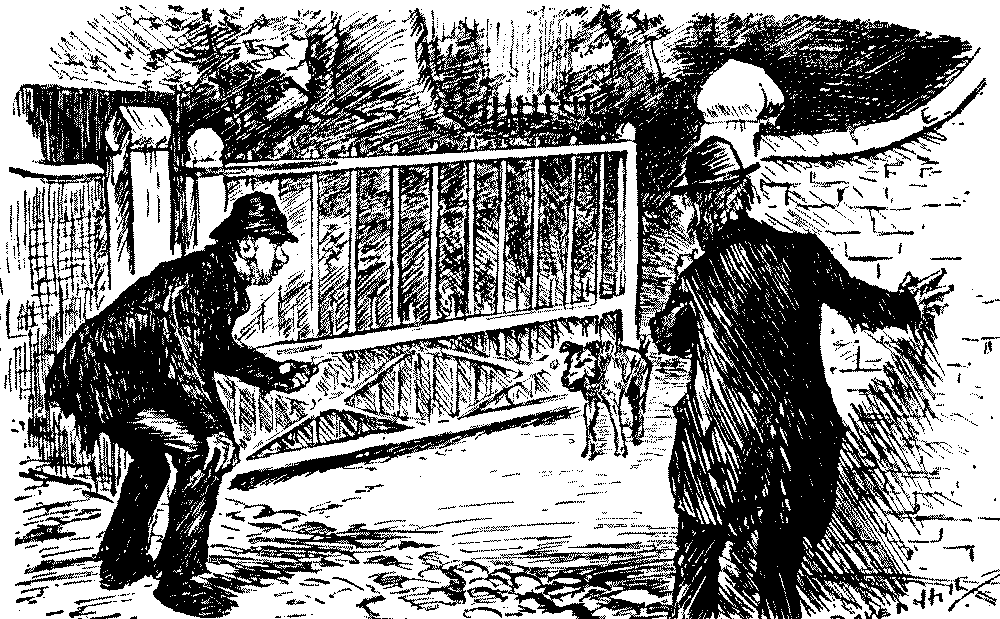
First Tramp. "Why don't you go in? 'E's all right. Don't you see 'im a-waggin' his tail?"
Second Tramp. "Yus; an' don't you see 'im a-growlin'? I dunno which end to believe!"

He. "I hope there are no bulls in here. I can't run as fast as I used to."
She. "I'm told that's the worst thing to do. I think if you stand and look at them, it's enough to send them away!"
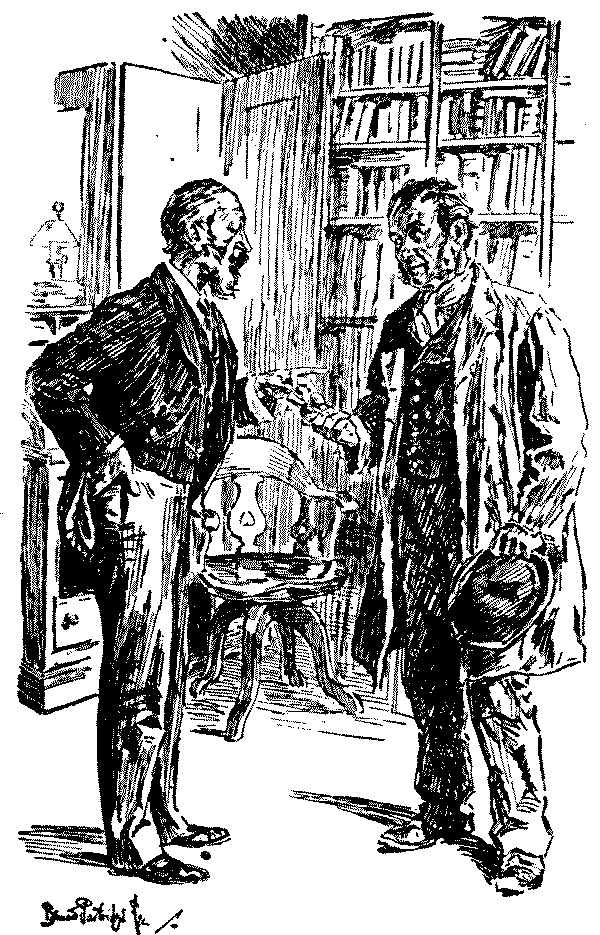
Doctor. "Now remember, my man, three or four drops of this mixture three times a day—and inhale."
Patient. "Be I to take it in four or six hale, guv'nor?"
| Silo (Sigh low). | Judging Stock. |
| Best Turn Out of Horse and Cart. | Hurry For'ds (Herefords). |
| Threshing Machine. | The Cat 'll Show. |
| Live Stock. | Jerseys. |
| A Tuber. | Pa's-Nips. |
In a Somersetshire Inn.—Mr. Fitz-Archibald Smith (of London, to the Landlord).—Is there a hair-dresser in the village? I want to be shampooed and shaved.
Landlord. Well, zur, I doant know much about the shampoodling, but our ostler's used to clipping horses. Would 'e like to try him?
"A Little Learning."—Lady Tactful (visiting small farmer). I hope, John, the rain has not damaged the wheat.
John. Ah, my lady, some of it will never grow; the wet has busted it.
Mrs. John (who is "educated"). He should have said "bursted" my lady. That's what he means.
Lady Tactful. Never mind. I think I prefer the old-fashioned pronunciation.

Amateur Gardener (to goat-fancying neighbour). "Hi, madam. One of your confounded pets has got into my garden, and is eating my bedding-plants!"
Neighbour. "Good gracious! I trust they are not poisonous!"
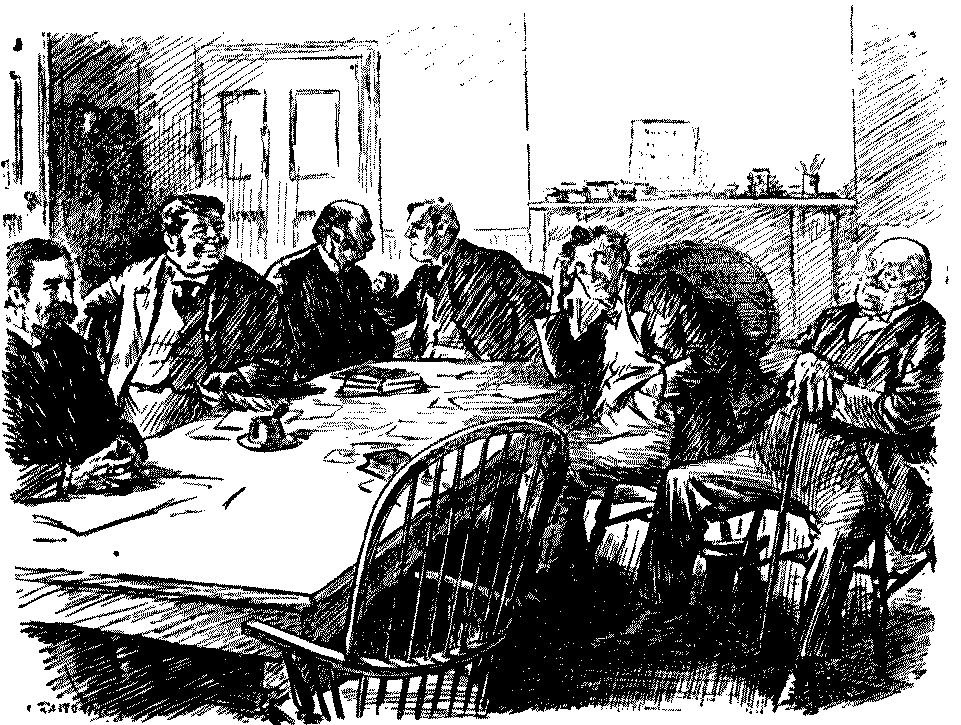
More Amalgamation.—Parish Councillor. "Wull, I do voate that the two par'shes be marmaladed."
Chairman. "Our worthy brother councillor means, I understand, that the two parishes should be jammed together!"
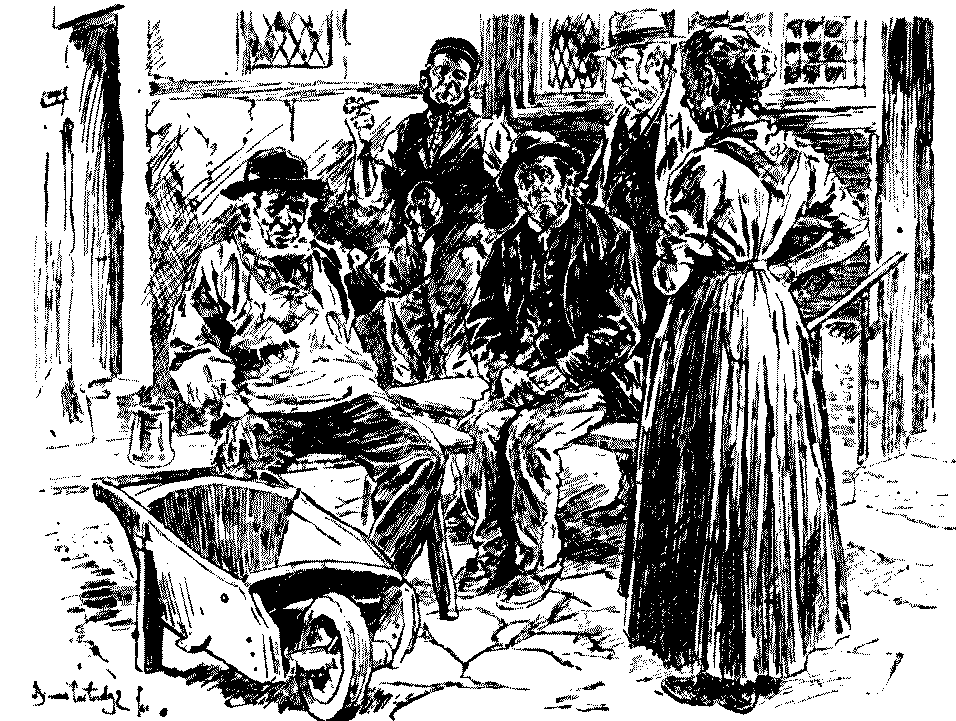
Village Gossip. "Did ye 'ere as owd Sally Sergeant's dead? 'Er what's bin pew-opener up to Wickleham Church nigh on fifty year."
The Village Atheist (solemnly). "Ah! see what comes o' pew-openin'!"
The Highest Possible Record of Character.—New Rector of Swaddlington (to Sexton). I see that the forge is close by the church, Grassmore. I hope that the smith is one of our friends?
Sexton. Why, bless 'ee, yes, sir, 'e 's the only man in all the parish as settled over the Cesarewitch.
A Perfect Cure.—Town Man. "How jolly it must be, living down here in the country!"
Country Gentleman. "Oh, I don't know. It's rather a torpid sort of life; time passes very slowly."
Town Man. "Time passes slowly? You should get somebody to draw on you at three months!!"

Forbearance.—Young Lady. "John, how long shall you be, as I want to practise?"
Gallant Young Gardener. "Oh, goo yeouw on, Miss Amy—goo yeouw on! I sha'n't mind yar noise!"
First Farmer (recognising Second Farmer). Why, 'tis Muster Fretwail, surelie! didn't see it was you afore. And how be things gettin' along with you, sir, eh?
Farmer Fretwail (lugubriously). 'Mong the middlin's, Muster Lackaday; 'mong the middlin's! Nothen doin' just now—nothen 't all!
Third Farmer (enviously). Well, you hevn't no call fur to cry out, neighbour! I see you've got a likely lot o' noo 'oardins comin' up all along your part o' the line. I wish mine wur arf as furrard, I know thet!
F. Fretwail. Ah, them "Keep yer 'air on" 's, you mean, Ryemouth. I don't deny as they was lookin' tidy enough a week back. But just as I was makin' ready fur to paint up "Try it on a Billiard Ball," blamed if this yere frost didn't set [Pg 90]in, and now theer's everything at a standstill wi' the brushes froze 'ard in the pots!
F. Ryemouth. 'Tis the same down with me. Theer 's a acre o' "Bunyan's Easy Boots" as must hev a noo coat, and I cann't get nothen done to 'en till th' weather's a bit more hopen like. Don' keer 'ow soon we hev a change, myself, I don't!
F. Lackaday. Nor yet me, so long as we don't 'ave no gales with it. Theer was my height-acre pasture as I planted only las' Candlemas wi' "Roopy's Lung Tonics"—wunnerful fine and tall they was too—and ivery one on 'en blowed down the next week!
F. Fretwail. Well, I 'ope theer wun't be no rain, neither, come to that. I know I 'ad all the P's of my "Piffler's Persuasive Pillules" fresh gold-leaved at Michaelmas, and it come on wet directly arter I done it, and reg'lar washed the gilt out o' sight an' knowledge, it did. Theer ain't no standin' up agen rain!
F. Ryemouth. I dunno as I wouldn't as lief hev rain as sun. My "Hanti-Freckle Salves" all blistered up and peeled afoor the summer was 'ardly begun a'most.
F. Lackaday. 'Tis a turr'ble 'ard climate to make 'ead against, is ourn. I've 'eard tell as some farmers are takin' to they enamelled hiron affairs, same as they used to hev when I wur a lad. I mind theer wur a crop o' "Read Comic Cagmag" as lingered on years arter the paper itself. Not as I hold with enamelling, myself—'tain't what I call 'igh farmin'—takes too much outer the land in my 'pinion.
F. Fretwail. Aye, aye. "Rotation o' boards." Say, "Spooner's Sulphur Syrup" fur a spring crop, follered with some kind o' soap or candles, and p'raps cough lozengers, or hembrocation, or bakin' powder, if the soil will bear it, arterwards—that's the system I wur reared on, and theer ain't no better, 'pend upon it!
F. Ryemouth. I tell 'ee what 'tis; it's time we 'ad some protection agen these yere furrin advertisements. I was travellin' along the Great Northern tother day, and I see theer was two or three o' them French boards nigh in ivery field, a downright shame an' disgrace I call it, disfigurin' the look o' the country and makin' it that ontidy—let alone drivin' honest British boards off the [Pg 94]land. Government ought to put a stop to it; that's what I say!
F. Lackaday. They Parliment chaps don't keer what becomes of us poor farmers, they don't. Look at last General Election time. They might ha' given our boards a turn; but not they. Most o' they candidates did all their 'tisin' with rubbishy flags and balloons—made in Japan, sir, every blamed one o' them! And they wonder British agriculture don't prosper more!
F. Ryemouth. Speakin' o' queer ways o' hadvertisin', hev any on ye set eyes on that farm o' young Fullacrank's? Danged if iver I see sech tom-fool notions as he's took up with in all my born days!
F. Fretwail. Why, what hev he bin up to now, eh?
F. Ryemouth. Well, I thought I shud ha' bust myself larfin' when I see it fust. Theer ain't not a board nor a sky sign; no, nor yet a 'oarding, on the 'ole of his land!
F. Lackaday. Then how do he expect to get a profit out of it?—that's what I want to year.
F. Ryemouth. You' ll 'ardly credit it, neighbours [Pg 96]but he's been buryin' some o' they furrin grains, hoats and barley, an' I dunno what not, in little 'oles about his fields, so as to make the words, "Use Faddler's Non-farinaceous Food"—and the best on it is the darned young fool expecks as 'ow it'll all sprout come next Aperl—he do indeed, friends!
F. Fretwail. Flyin' in the face of Providence, I calls it. He must ha' gone clean out of his senses!
F. Lackaday. Stark starin' mad. I never heerd tell o' such extravagance. Why, as likely as not, 'twill all die off o' the land afore the year's out—and wheer wull he be then?
F. Ryemouth. Azackly what I said to 'en myself. "You tek my word for it," I sez, "'twun't niver come to no good. The nateral crop for these yere British Hisles," I told 'en, "is good honest Henglish hoak an' canvas," I sez, "and 'tain't the action of no sensible man, nor yet no Christian," sez I, "to go a drillin' 'oles and a-droppin' in houtlandish seeds from Canada an' Roosha, which the sile wasn't never intended to bear!"
Farmers Fretwail and Lackaday. Rightly spoke, neighbour Ryemouth, 'twas a true word! But theer'll be a jegement on sech new-fangled doin's, and, what's moor, you and I will live fur to see it afore we're very much older!
[They all shake their heads solemnly as scene closes in.

The New Curate. "Superb day, isn't it?" Giles. "Ay?" Curate. "Superb day." Giles. "Ay?" Curate. "Er—a—superb—day!" Giles. "Whoa, Dobbin!" (Pulls up). "Ay?" Curate. "I only remarked—er—it was a superb day." Giles. "D——! Gw'on, Dobbin!"

Serious Old Party. "Eh, but this is a wicked world!"
Flippant Individual. "You are right, Mrs. Mumble. For my part, I shall be quite satisfied if I get out of it alive!"

Obliging.—Lady (to village jobber, who for days has been "working" in the house). "Can you tell me when you are likely to have finished this job?" Village Jobber. "If you can tell me, mum, wheer I'm likely to get another."

Useful information.—Jones (who has forsworn town life for a more healthful existence, to hired compendium of agricultural knowledge at 14s. 6d. a week, with cottage and 'tater patch). "Do you know anything about bees, Isaac?" Isaac. "Yes, they stings!"
[This is the second Nature article that has recently arrived at Mr. Punch's offices through inadvertence. It was obviously intended for The Country-Side, the new Harmsworth-Robinson organ, which is designed to bring home to townsmen the wonders of country life.]
Evening in the country! A Spring evening! Ah, you dweller in the close perfervid city, how I wish I could have transported you to my side yesterday, while I stood and watched the sinking fire of day (a bright impulsive fellow this sun) waving me from his Orient window.
How I wish you could have lain near me on that pile of fresh-cut hay, redolent of clover and the scarlet vetch, lulled to sleep, it may be, by the low [Pg 100]moaning of rats in the stack, or the melancholy hoot of the night-jar! Sleep follows swiftly, sleep such as you denizens of the crowded street can never know—sleep beneath the stars.
Up with the lark! Shelley's skylark! There he is, the blithe unconscious creature, hovering above the plough-share, ready to pounce upon the first unwary field-vole upturned from his
My heart is full to bursting as I pass onward into the harvest-field and watch the gleaners at their busy toil. For one thing I have my "Topical Quotations" to prepare, and am "dividing my swift mind" between the Georgics of Virgil and Wordsworth's "Intimations of Immortality" for a suitable selection. Then there are the straw bonnets and rough smocks of the rustics to be sketched for the fashion-plate, and my column upon the Insanitary Condition of Birds' Nests to be compiled.
Yet how difficult to fix one's mind upon mere [Pg 102]journalism, when on this side and on that the lithe rabbit is popping up from his "forme," and beneath their white blossoms the red strawberries lurk under every springing hedge-tuft. A glass of creamy butter-milk supplied by the smiling lass at the cottage wicket, together with a light and delicious scone
under the sighing alders, has served me for my simple yet hygienic meal. And now as I watch the shepherd lead his flock of lowing kine into the pastures, the stately old bell-wether bringing up the rear, I feel that here is life indeed, and here (had the exigencies of a week-end return permitted) I could willingly have spent the remainder of my days, "the world forgetting, by the world forgot," but inexorable Fate with her iron shears forbids. I must
once more and my half-finished essay on "Cotton-spinning in our Great Public Schools." Brief dream, farewell!

Vicar's Daughter. "Well, John, I see you are looking as young as ever."
John. "Yes, miss, thankyee. An' they tell me I'll soon be an octogeranium."

"Oi be eighty-foive, zur."
"Dear me! You don't look it. And how old is your wife?"
"Oh, she be eighty-foive too. But she've looked it fer the last fowrty year!"
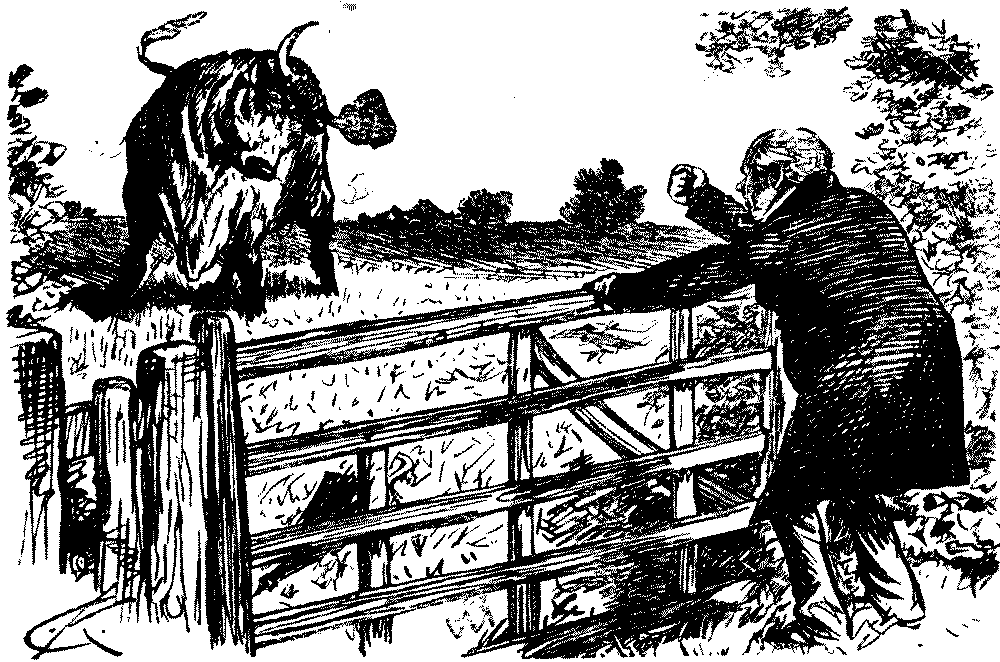
"Benefits Forgot!"—Old Gentleman (he had been chased across the field by the infuriated animal, and only just scrambled over the gate in time—gasping for breath). "You in—fernal un—gra'ful beast!—an' me—been veg'tarian allm'life!!"

First Farmer. "Aye, 'taters gets complaints now they never got in my young days."

"Be it true as your nevvy b'ain't a-goin' to marry that Miss Giles arter all?"
"Well, you see I 'vised 'un to gie up matrimony, an' take to a trade."

Pleasuring!—Vicar (to old lady, who is returning from a funeral). "Well, Martha, I'm afraid you've had a sad afternoon. It has been a long walk, too, for you——" Martha. "Sure-ly, 'tis sir; Ah, sir, 'tain't much pleasure now for me to go to funerals; I be too old and full o' rheumatiz. It was very different when we was young—that 'twer!!"
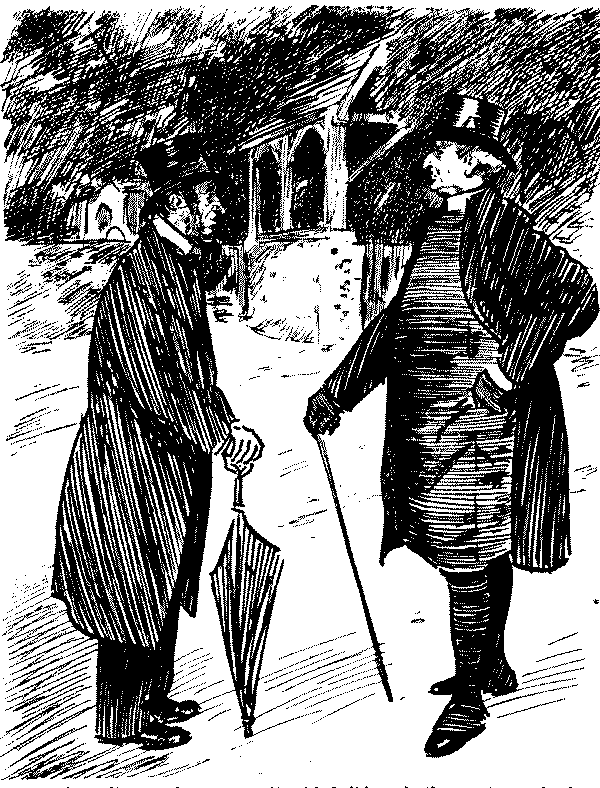
Sexton (to a divine, who was spending his holidays in the country and who, on the sudden illness of the village parson, volunteered to take the duties). "A worse preacher would have done for us, sir, but we couldn't get one!"

Predestined!—Northern Matron (before the School Board). "I'm not against eddication, ladies and gen'l'men. I al'ays make him take his book o' nights. But reelly I calls it a flyin' in the face o' providence to be keepin' a boy out o' the stables with such a pair o' legs as his'n!!"

Carrier. "Try zideways, Mrs. Jones, try zideways!"
Mrs. Jones. "Lar' bless 'ee, John, I ain't got no zideways."
(By Thomas of Wessex, Author of "Guess how a Murder feels," "The Cornet Minor," "The Horse that Cast a Shoe," "One in a Turret," "The Foot of Ethel hurt her," "The Flight of the Bivalve," "Hard on the Gadding Crowd," "A Lay o' Deceivers," &c.)
["I am going to give you," writes the Author of this book, "one of my powerful and fascinating stories of life in modern Wessex. It is well known, of course, that although I often write agricultural novels, I invariably call a spade a spade, and not an agricultural implement. Thus I am led to speak in plain language of women, their misdoings, and their undoings. Unstrained dialect is a speciality. If you want to know the extent of Wessex, consult histories of the Heptarchy with maps."]
In our beautiful Blackmoor or Blakemore Vale not far from the point where the Melchester Road turns sharply towards Icenhurst on its way to [Pg 112]Wintoncester, having on one side the hamlet of Batton, on the other the larger town of Casterbridge, stands the farmhouse wherewith in this narrative we have to deal. There for generations have dwelt the rustic family of the Peeps, handing down from father to son a well-stocked cow-shed and a tradition of rural virtues which yet excluded not an overgreat affection on the male side for the home-brewed ale and the home-made language in which, as is known, the Wessex peasantry delights. On this winter morning the smoke rose thinly into the still atmosphere, and faded there as though ashamed of bringing a touch of Thermidorean warmth into a degree of temperature not far removed from the zero-mark of the local Fahrenheit. Within, a fire of good Wessex logs crackled cheerily upon the hearth. Old Abraham Peep sat on one side of the fireplace, his figure yet telling a tale of former vigour. On the other sat Polly, his wife, an aimless, neutral, slatternly peasant woman, such as in these parts a man may find with the profusion of Wessex blackberries. An empty chair between them spoke with all an empty chair's eloquence of an absent inmate. A butter-churn [Pg 114]stood in a corner next to an ancient clock that had ticked away the mortality of many a past and gone Peep.
"Where be Bonduca?" said Abraham, shifting his body upon his chair so as to bring his wife's faded tints better into view. "Like enough she's met in with that slack-twisted 'hor's bird of a feller, Tom Tatters. And she'll let the sheep draggle round the hills. My soul, but I'd like to baste 'en for a poor slammick of a chap."
Mrs. Peep smiled feebly. She had had her troubles. Like other realities, they took on themselves a metaphysical mantle of infallibility, sinking to minor cerebral phenomena for quiet contemplation. She had no notion how they did this. And, it must be added, that they might, had they felt so disposed, have stood as pressing concretions which chafe body and soul—a most disagreeable state of things, peculiar to the miserably passive existence of a Wessex peasant woman.
"Bonduca went early," she said, adding, with a weak irrelevance, "She mid 'a' had her pick to-day.[Pg 116] A mampus o' men have bin after her—fourteen o' 'em, all the best lads round about, some of 'em wi' bags and bags of gold to their names, and all wanting Bonduca to be their lawful wedded wife."
Abraham shifted again. A cunning smile played about the hard lines of his face. "Polly," he said, bringing his closed fist down upon his knee with a sudden violence, "you pick the richest, and let him carry Bonduca to the pa'son. Good looks wear badly, and good characters be of no account; but the gold's the thing for us. Why," he continued, meditatively, "the old house could be new thatched, and you and me live like Lords and Ladies, away from the mulch o' the barton, all in silks and satins, wi' golden crowns to our heads, and silver buckles to our feet."
Polly nodded eagerly. She was a Wessex woman born, and thoroughly understood the pure and unsophisticated nature of the Wessex peasant.
Meanwhile Bonduca Peep—little Bo Peep was the name by which the country-folk all knew her—sat dreaming upon the hill-side, looking out with a premature woman's eyes upon the rich valley that stretched away to the horizon. The rest of the landscape was made up of agricultural scenes and incidents which the slightest knowledge of Wessex novels can fill in amply. There were rows of swedes, legions of dairymen, maidens to milk the lowing cows that grazed soberly upon the rich pasture, farmers speaking rough words of an uncouth dialect, and gentlefolk careless of a milkmaid's honour. But nowhere, as far as the eye could reach, was there a sign of the sheep that Bo had that morning set forth to tend for her parents. Bo had a flexuous and finely-drawn figure not unreminiscent of many a vanished knight and dame, her remote progenitors, whose dust now mouldered in many churchyards. There was about her an amplitude of curve which, joined to a certain luxuriance of moulding, betrayed her sex even to a careless observer. And when she spoke, it was often with a fetishistic utterance in a monotheistic falsetto which almost had the effect of startling her relations into temporary propriety.
Thus she sat for some time in the suspended attitude of an amiable tiger-cat at pause on the edge of a spring. A rustle behind her caused her to turn her head, and she saw a strange procession advancing over the parched fields where—[Two pages of field-scenery omitted.—Ed.] One [Pg 122]by one they toiled along, a far-stretching line of women sharply defined against the sky. All were young, and most of them haughty and full of feminine waywardness. Here and there a coronet sparkled on some noble brow where predestined suffering had set its stamp. But what most distinguished these remarkable processionists in the clear noon of this winter day was that each one carried in her arms an infant. And each one, as she reached the place where the enthralled Bonduca sat obliviscent of her sheep, stopped for a moment and laid the baby down. First came the Duchess of Hamptonshire followed at an interval by Lady Mottisfont and the Marchioness of Stonehenge. To them succeeded Barbara of the House of Grebe, Lady Icenway and Squire Petrick's lady. Next followed the Countess of Wessex, the Honourable Laura and the Lady Penelope. Anna, Lady Baxby, brought up the rear.
Bonduca shuddered at the terrible re-encounter. Was her young life to be surrounded with infants? She was not a baby-farm after all, and the audition of these squalling nurslings vexed her. What could the matter mean? No answer was given to these questionings. A man's figure, vast and terrible, appeared on the hill's brow, with a cruel look of triumph on his wicked face. It was Thomas Tatters. Bonduca cowered; the noble dames fled shrieking down the valley.
"Bo," said he, "my own sweet Bo, behold the blood-red ray in the spectrum of your young life."
"Say those words quickly," she retorted.
"Certainly," said Tatters. "Blood-red ray, Broo-red ray, Broo-re-ray, Brooray! Tush!" he broke off, vexed with Bonduca and his own imperfect tongue-power, "you are fooling me. Beware!"
"I know you, I know you!" was all she could gasp, as she bowed herself submissive before him. "I detest you, and shall therefore marry you. Trample upon me!" And he trampled upon her.
Thus Bo Peep lost her sheep, leaving these fleecy tail-bearers to come home solitary to the accustomed fold. She did but humble herself before the manifestation of a Wessex necessity.
And Fate,[Pg 126] sitting aloft in the careless expanse of ether, rolled her destined chariots thundering along the pre-ordained highways of heaven, crushing a soul here and a life there with the tragic completeness of a steam-roller, granite-smashing, steam-fed, irresistible. And butter was churned with a twang in it, and rustics danced, and sheep that had fed in clover were "blasted," like poor Bonduca's budding prospects. And, from the calm nonchalance of a Wessex hamlet, another novel was launched into a world of reviews, where the multitude of readers is not as to their external displacements, but as to their subjective experiences.

Master Tommy (returning from the funeral). "Why did Uncle Jonas cry so for, Aunt? He cried more than anybody!"
Aunt (grimly). "Of course! Most of the property is left to him, my dear!"

First Gossip. "So you was nivver axed tu t'funeral?"
Second Gossip. "Nivver as much as inside t'house. But nobbut; wait till we hev' a funeral of us own, an' we'll show 'em!"

Parson. "Why, John, what are you doing there?"
John. "I be too wet to work, zur."
Parson.. "Well, if it's too wet to work, why don't you go home?"
John. "Wull, my old 'ooman, she do jaw so!"

Young Lady. "Can you tell me the nearest way to get to Pulham from here?"
Sweep. "Well, miss, I'm going there meself. So, if yer jump in, I'll drive yer!"
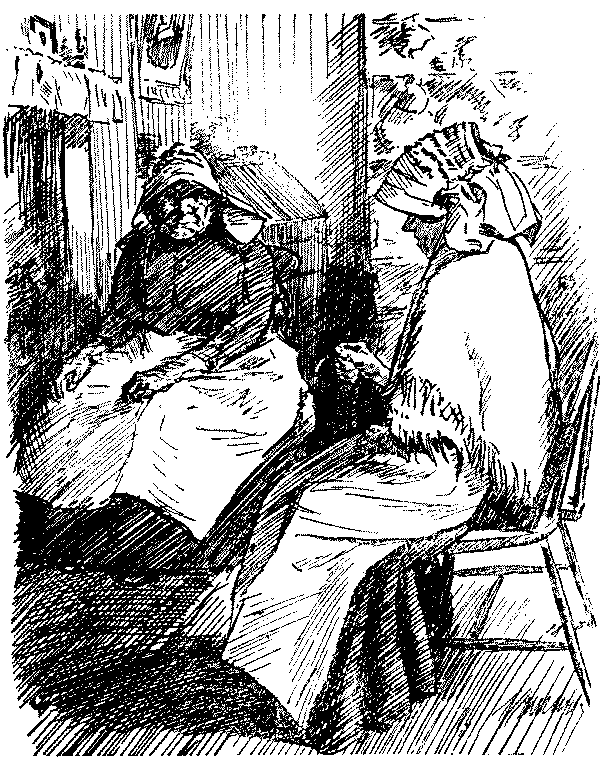
First Village Dame. "Did I bring you back that basket you lent me last week?"
Second Dame (emphatically). "No, indeed, you did not."
First Dame. "That's a pity, for I just came round to borrow it again!"
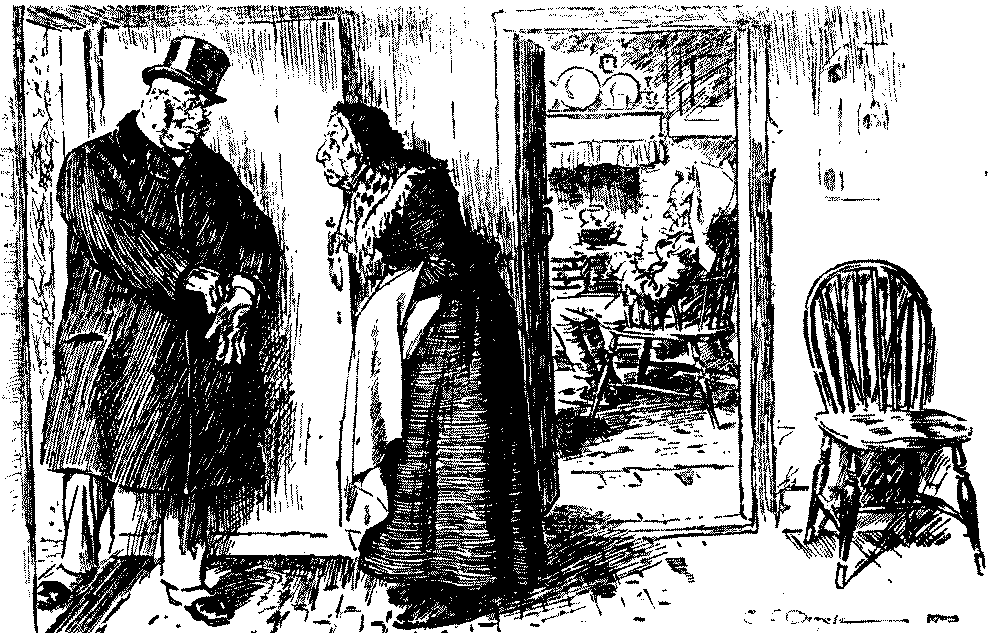
Hard on the Doctor—Old Lady. "My 'usband 'e never did 'old with doctors, and 'e wouldn't let me send for yer till 'e was real bad. What's wrong with him, doctor?" Doctor. "Mainly senility, Mrs. Wilkins." Old Lady. "Lor' now! An' I dessay 'e wouldn't 'ave 'ad it if 'e'd 'ad yer soon enough!"

"There are more things in Heaven and Earth, Horatio, than are dreamt of in your philosophy."—Hamlet.
Old Jarge. "Wen ye sees wot comes from furrin parts, bless yer 'eart, ye just feels like a bit o' dirt!"

"Did ye see the Lord Mayor when you was up to Lunnon?"
"Aye, lad, I did."
"De' 'e gang aboot wi' a chain?"
"No; 'e gangs loose!"

Miss Hobbs (who dislikes tobacco). "I see you are at your idol again!"
Smoker. "Yes; I'm burning it!"

"Th' ole squire stop an' spoke to me this marnin'; an' Oi ast 'im 'ow Master Philip was gettin' on in Lunnon. 'Oh,' says 'e, ''e 's bin called to the Bar.' Oi dunno wot 'e meant, so Oi didn' say nothin'; but Oi says to meself, 'Ah,' Oi says, 'from what Oi remember of 'im, 'e didn' want no callin'!'"
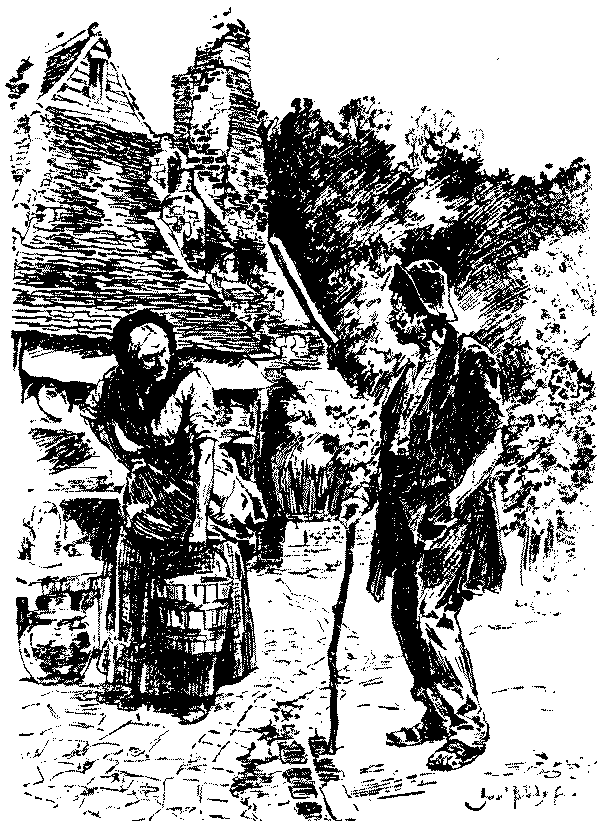
Accommodating.—Old Lady. "Now then, what do you want?" The Tramp. "I ain't pertickler, lady. What 'av' yer got?"

The Vicar's Daughter. "Papa was very shocked, Giles, to see you standing outside the 'Green Man' this morning, after church."
The Village Reprobate. "Oi can 'sure ye, miss, it wus na fault o' moine that I wus standin' ootside!"]

"I'm surprised to find that you keep a dog, Tomkins! Why, you can barely keep your wife! What on earth do you feed him on?"
"Well, I gives 'im cat's-meat. And when I can't afford that, why, 'e 'as to 'ave wot we 'ave."

Mrs. A. "I've just been to see a poor soul who was almost dying of destitution." Miss B. "Did you take her anything?" Mrs. A. "Yes—a pound of mutton." Miss B. "That wasn't much, was it?" Mrs. A. (indignantly). "Quite enough to make her some beef tea!"

A Sure Sign of Improvement.—Village Doctor. "Well Scroggins, I hope your wife is much better to-day, eh? How is her pulse, eh? And how's her temperature?"
Scroggins (considering). "Well, doctor, I don't know much about her pulses, but as for her temper"—(feelingly)—"she's got a plenty of that to-day!"

"Well, Simpson, how do you like the hot weather?"
"Can't stand it, sir! It's hawful! Ain't got no stomach for my victuals, sir!"
Scene—A large open space near a cathedral town. Fat old farmers in white hats, and smart young farmers in Newmarket coats and neat riding boots; elderly shepherds in blue, grey, and white smocks. From time to time there is a stampede of bewildered bullocks, whose hind legs are continually getting hitched over each other's horns. Connoisseurs lean over pen-rails and examine pigs reverently, as if they were Old Masters. Others prod them perfunctorily. The pigs bear these inconveniences meekly, as part of the penalty of greatness. Sheep look over one another's shoulders and chew nervously on one side of their mouths.
First Enthusiast. Did y' iver see sech a sow as that theer? I niver did, and (aggressively) naw moor yo' didn't neither, 'Enery, did ye now?
'Enery (unimpressed). I doan't see naw 'dvantage in heving pigs so big as that theer.
First Enth. Big! She's like a elephant. Theer's a lop ear now—weighs thutty-four stoan if she weighs a hounce, she do!
[The sow grunts complacently.
'Enery. Ah. I 'ad one loike 'er, I 'ad. Eat three bucketsful a day, she did, and (with a sense of unforgettable injury) mis'able little pegs she 'ad with it all!
Second Enth. I go in fur Berkshire myself But Sussex are very good; they scale so much better 'n they look; full o' flesh they are—weigh a good stun moor nor ye'd take 'em fur, and then they cut up so well! (With a dreamy tenderness.) Yes, I'm fond o' they Sussexes, I am—very fond of 'em!
A Dealer (trying to dispose of a litter of small black pigs). Seven good ole stiddy little pigs! I don't care 'oo buys 'em (as if he usually required the strictest testimonials to character). I must sell 'em. Pig-buyin' to-day, sir? You'd better 'ave that little lot, sir.
[Persuasively, to a passer-by, who however appears to think he had much better not.
Intending Purchaser (to Seller). What d'ye carl them yoes now? Southdowns?
[He fixes his eyes on the cathedral spire, and awaits the next move.
Seller (after watching a rook out of sight, stirs up the sheep meditatively, and decides on candour). Well—bout aaff an' aaff.
Int. Purch. Old yoes—well, ye know, 'taint like young yoes, be it now?
Seller (when he has finished shredding tobacco in the palm of his hand). That's true enough.
Int. Purch. I dunno as I can do wi' any moor shep just now, if 'twas iver so.
Seller (listlessly). Cann't ye, now? Theer's bin a genl'man from Leicestershire 'ere, wawntin' me to run 'im off a dozen or so—fur his perrk, d'ye see?
Int. Purch. (with unaffected incredulity). Ah.
[A protracted silence, employed by each in careful inspection of his boots.
Seller (addressing space). They're a tidy lot o' yoes.
Int. Purch. (as if this was a new view of them, which would require consideration). Come off o' your own farm?
Seller. Druv 'em in myself this very marnin'.
Int. Purch. Ah. (A pause apparently spent in mental calculation.) What might ye be askin' for 'un now?
Seller. For them yoes?
Int. Purch. Ah.
Seller (falls into a brown study, from which he at length emerges to tap the nearest ewe on the forehead and expectorate). I wawnt five-an'-twenty shellin' a yead for them yoes.
Int. Purch. Five-an'-twenty?
Seller. Ah, that's what I wawnt.
[A longer silence than ever.
Int. Purch. I s'pose ye aint seen ole Jim 'Arrows 'bout 'ere this marnin', hev ye?
[After some further preliminaries of this kind the moment at length arrives at which a bargain can be struck without any suggestion of unbecoming haste on either side.

Anything to oblige.—Old Lady. "I wish you would make him go faster. I shall be late for the market." Carrier. "Well, you see, mum, he always falls on his head if he trots down-hill. He can't trot up-hill, for he's broken-winded, and if you hurry him on the level he mostly has a fit of blind staggers. But we'll try if you like, mum. Come up, hoss!"

Free and Independent Voter. "Wull, if they can't zend zummat better than thic ther cart to fetch I to the poll, I ain't a-goin' to vote. Zo there's an end of it; and you can go back an' tell 'um zo!"

Farmer. "Well, Giles, what do you think of him?"
Giles. "I reckon he's allers in at meal-times, sir!"

Curate. "Oh—er—by the way, Mr. Bloggs, I was wondering whether you would give me a small subscription for a most excellent object: I mean the repairing of the cemetery wall."
Wealthy Parvenu. "Not me, sir. The cemetery wall don't need any repairing. Them as is inside can't get out, an' them as is outside don't want to get in. Good mornin'!"
First Rustic (just out of the County Hospital). An' they putt me under that theer chlorryfum—an' I simmed to go right oop into 'Evin—yes, I wur oop in 'Evin fur a toime, sure 'nough.
Second Rustic (with interest). An' did ye 'ear a pianner?
Elderly Farmer (who is being applied to for the character of his late shepherd). No, I never 'ad no fault to find wi' the fellow—(conscientiously) not as I knows on. He unnerstan's shep—I will say that fur 'en—he's a rare 'un at doctorin' of 'em, too. An' a stiddy chap an' that, keps a civil tongue in 'is yead, and don't go away on the booze. No, I aint got nawthen' to say 'gainst th' man.
The Inquirer. Would ye hev any objection to sayin' why ye're partin' wi' en?
Eld. F. Well, I dunno as theer was any partickler reason for 't. (He endeavours to think of one in a puzzle-headed way.) I s'pose I must ha' thowt I'd make a bit of a shift like—and theer ye hev it.
First Stock-breeder (to Second). Well, an' how's Muster Spuddock to-day?
Muster Spuddock. Oh, 'mong th' middlins—'mong th' middlins. Pretty well fur an old 'un?
First Stockbr. An' how's trade with you, eh?
Muster Sp. (beaming). Oh, nawthen' doin'—nawthen' doin' 't all!
First Stockbr. (with equal cheerfulness). Same 'ere, sir—same 'ere. On'y thing that's got money has been th' dead meat.
Muster Sp. (without appearing to envy the dead meat on this account). Ah, that's it. Ye cann't reckon on moor nor thrippence,—an' your own expenses, i' coorse.
First Stockbr. An' thet's borderin' nigh on fowerpence; an' when it comes to two pound a bullock——!
[They shake their heads with an unsuccessful attempt to look lugubrious at these cryptic considerations.
Muster Sp. Well, well; sheep food's goin' to be plentiful, too, right up to Christmas.
First Stockbr. That's the way to look on it.
[They go off to dine at the ordinary, with a sense that matters might be worse.

Jones, who can't sleep well in London during the hot weather, goes to have a quiet night in a village!

Education.—Squire. "Hobson, they tell me you've taken your boy away from the National School. What's that for?" Villager. "'Cause the master ain't fit to teach un!" Squire. "O, I've heard he's a very good master." Villager. "Well, all I knows is, he wanted to teach my boy to spell ''taters' with a 'p'!!!"

Compliments of the Season.—Farmer's Wife (to little rustic, her protégè). "Well, Sam, your master and I are going up to London for the cattle show."
Cow Boy. "Oh, I'm sure I hope yeou'll take the fust prize, 'm—that I dew!"

"In the Long Run."—Town Gent. "Now do you find keeping poultry answers?" Country Gent (lately retired). "O, 'es, s'posed to answer. Y' see there's the original cost of the fowls—'f course the food goes down to me, y' know. Well, then, I purchase the eggs from the children, and they eat them!!!"

Milkman (aghast, anxiously). "Hullo! Wot's that?"
Old Woman. "Hish! Our lodger, just come. Open-air cure!"
At the Cattle Show.—- Young Farmer. "Are you fond of beasts, Miss Gusherton?"
Miss Gusherton. "Oh, really, Mr. Pawker, if you mean that as a declaration, you must speak to mamma!"

Rector. "Why, doctor, where are you off to? I thought the meet was down at the cross roads."
Doctor. "Well, the fact is, I've got a patient up here that I must see, and the hounds are certain to come this way."
Rector. "I see. Killing two birds with one stone, eh?"

"Opposition."—First Town Councillor (who had recently been to Venice). "Now that we've a people's park, and a lake in it, I should suggest that half a dozen gondolas might be purchased, as they'd give quite a——" Second Ditto (untravelled). "Oh, I don't see the good of havin' any more o' them foreign birds! We've plenty of ducks an' geese already! 't any rate a pair would be enough to breed from. As to 'alf a dozen, I consider it'd be a waste o' public money, an' I'll oppose it tooth and——" [They don't part friends.

The Squire. "I don't seem to know your face, my man. Do you live about here?"
Old Rustic. "Yes, sir. But, yer see, I ain't often at the public-'ouse!"

First Doubtful Character. "This yer's all 'umbug about a thief not bein' able to look a honest man in the heye."
Second Doubtful Character. "Well, if 'e can't, 'e can punch 'im in the heye!"

Gentleman. "Who do these pigs belong to, boy?"
'Chaw.' "Why, this 'ere owd zow."
Gentleman. "Yes, yes; but I mean who's their master?"
'Chaw.' "Why, that there little 'un; he's a varmun to foight!"

Daughter of the house (dishevelled and torn after one turn round the room with clumsy partner). "Do you mind very much, Mr. Quickstep, if we sit out the rest of it?"
Mr. Quickstep. "Jest as you like, miss. I'm only a-dancin' for your pleasure!"

Miss Marjorie. "And how is your son James getting on, Mr. Giles?"
Giles (whose son has gone to London "in service"). "Well, to tell ye the truth, Miss Marji, Oi'm very troubled about 'im. Oi 'ad a letter last week, an' 'e says that 'e's livin' in a buildin' with 'undreds of people in it, an' it's three or fowr 'ouses one on top o' t'other. 'E says there's a railway carriage without an ingin' that goes up the middle o' th' buildin', an' the lights is all in bottles, an' you turns 'em on with a tap without usin' a loocifer, an'——"
Miss Marjorie. "But why are you troubled about James?"
Giles. "Aye, Oi fear 'e must 'a took to drink, miss!"
Sympathy.—Giles (ruefully). "Villiam, I've been an' gone an' 'listed!"
William. "Lor'! 'ave yer, though? Got the shillin'?"
Giles. "Yes."
William. "Well, then, let's go an' 'ave a glass at the 'Barley-Mow.' Don't let's be down'earted!"

Quite a Different Thing.—Vicar's Wife. "Well, Mrs. Bloggs, I'm glad to hear your husband has given up drinking. I hope he's all the better for it?" Mrs. Bloggs. "Oh, yes, 'm, that he be. Why, ever since 'e took the pledge, he's been more like a friend than a husband!"

Visitor (to old lady and daughters, one of whose hobbies is the keeping of a small herd of Jerseys). "By the way, I didn't see you at our local agricultural show."
Daughter. "Oh, no! We never go unless we exhibit ourselves."

A Slight mistake.—Farmer. "Where 'ave ye been all this time? And where's the old mare—didn't ye have her shod as I told ye?" Jarge. "Shod! Law, no, marster. I bin a buryin' she! Didn't I think thee said 'shot'!"
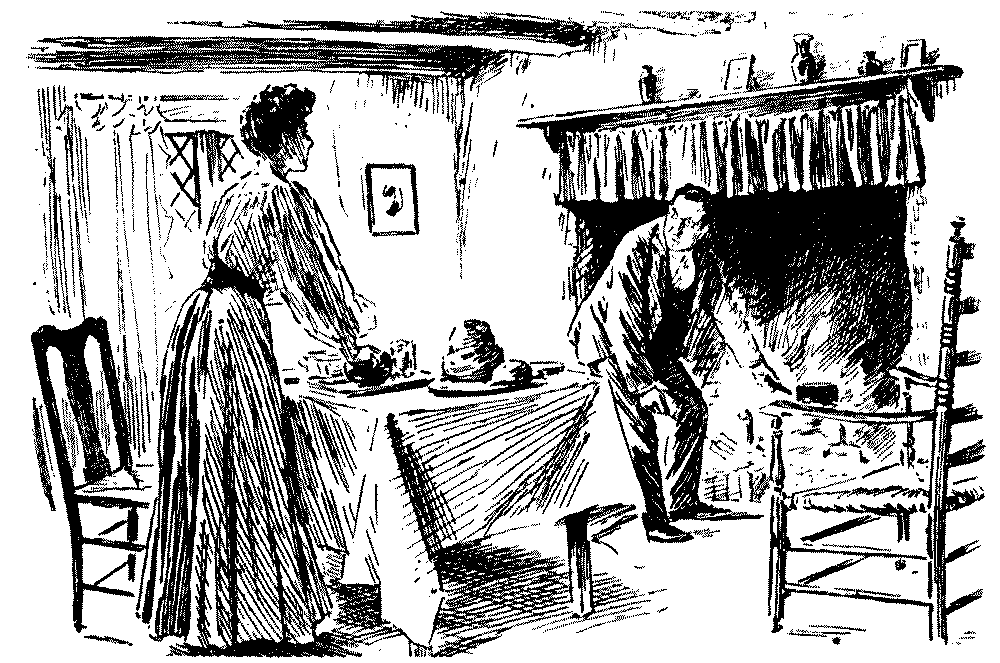
Mr. Fitzpudgit. "What's the matter with the eggs, Matilda? I've tried them with a fork two or three times, and they're not soft yet!"
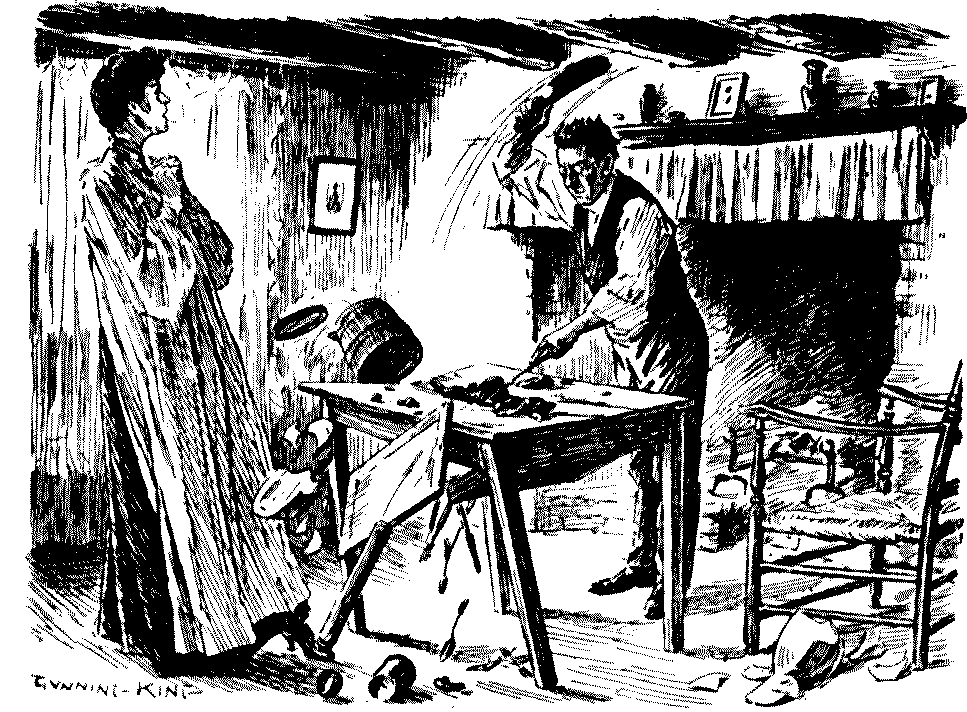
Mr. Fitzpudgit. "Now don't faint again, my dear. I'll soon have this old rabbit in bits, now!"

Charwoman. "If yer please, sir, th' landlord says as 'ow 'e can't do nothin', 'cos the thatcher's busy with the ricks."

Mrs. Fitzpudgit. "What is it, dear?" Mr. F. "Nothing, my love. Only another puncture."

Vicar's Wife. "I see, Mrs. Fieldsend, that Mary is home again."
Mrs. Fieldsend. "Yes, m'm. You see, she has been a year at Crowe Rectory, and eighteen months at Exholme Vicarage, and now we want her to go into a gentleman's family!"
Family Jars.—Joan. "The idear of Susan's askin' John to William's funeral, after the way 'e'd beyaved! I shouldn't certainly ever dream of askin' 'im to yours!"
Darby. "What! Then all I can say is, I should be very much offended if you didn't!"
Live Stock.—Little Miss Townley. "Was that honey we had at breakfast 'home-made,' Mr. Stubbs?"
Farmer Stubbs. "Why, surely, missy."
Little Miss T. "Oh! Then I suppose you keep a bee?"

Country Barber (affably, to total stranger). "Very tryin' weather this, sir. Makes you feel as if you'd like your body in a pond, an' your 'ead in a public-'ouse!"

The Rector's Daughter. "My father feels it very much, Mrs. Barker, that you should leave the church every Sunday just before the sermon. Don't you think you might try and stay, in future?"
Mrs. Barker. "I dursn't do it, miss. I do snore that dreadful when I'm asleep!"

Lady (calling on new Vicar's young wife). "Have you seen the library at the Hall? Sir George is quite a bibliophile, you know."
Vicar's Wife (warmly). "Oh, I'm so glad to hear that! So many of these wealthy men have no religion!"

Lady Visitor (to old parishioner). "Well, Mr. Huggins, and has the nurse been to see you yet?" Old Parishioner. "Yes, mum, thank 'ee. She's called once, an done my foot more good than all the imprecations I've ever used!"

"These 'ere barbers makes a rare lot o' fuss about it, but 'tain't nowt to sheep shearin'."
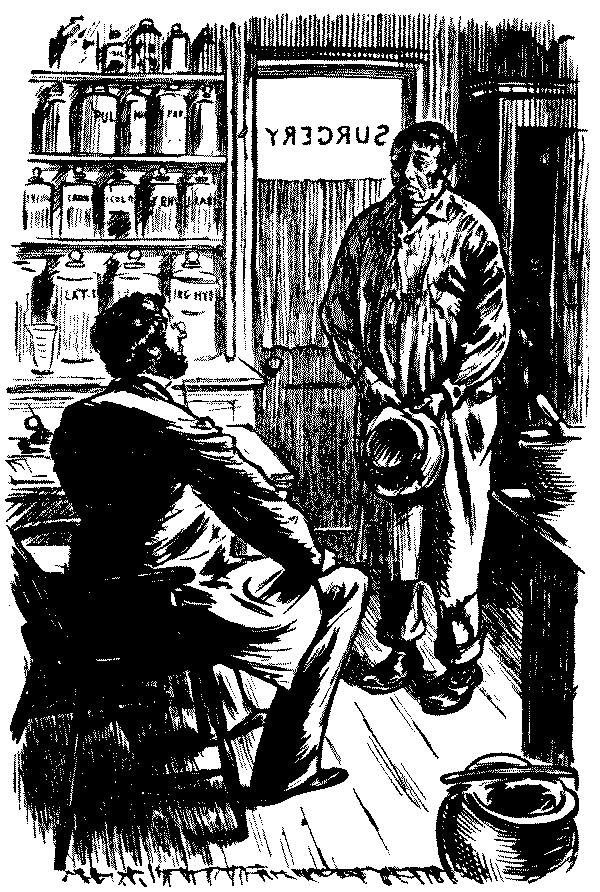
Diet.—Village Doctor. "Well, are you better? Have you taken your medicine regularly, and eaten plenty of animal food?" Patient. "Yes, sir, I tried it, and so long as it were be-ans and o-ats, I could manage pooty well, sir; but when you come to that there chopped hay, that right-down choked me, sir!"

He. "The fellah actually thweatened to blow my bwains out!"
She. "Oh, how could he? Of course he wasn't serious."

The Force of Habit.—Our County Member (attending church during the Recess). "I beg to move, sir, that the question be now put!"

Our Christmas Concert.—The Rector (who conducts the Rehearsal). "Suppose we try that movement again? I think, Mr. Footles, you were half a bar behind in taking up your point. Oh dear!—you're not going, Mr. Foo——" Mr. Footles (our Flauto Secondo, huffed). "Yessir. 'F you're so pertic'lar's 'alf a bar, I sha'n't jine the s'ciety!!"
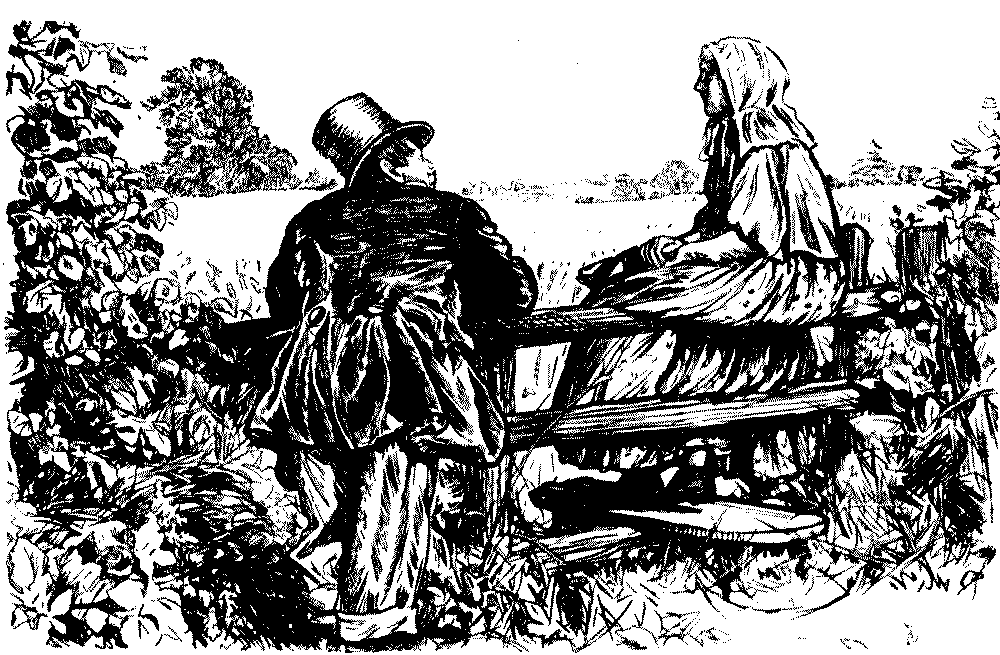
Artful—very.—Mary. "Don't keep a screougin' o' me, John!" John. "Wh'oi bean't a screougin' on yer!" Mary (ingenuously). "Well, y' can i' y' like, John!"

Stranger. "I suppose there's not much society about here?"
Barber. "Society! Why there ain't two soup an' fish families within a radius o' fifteen mile!"
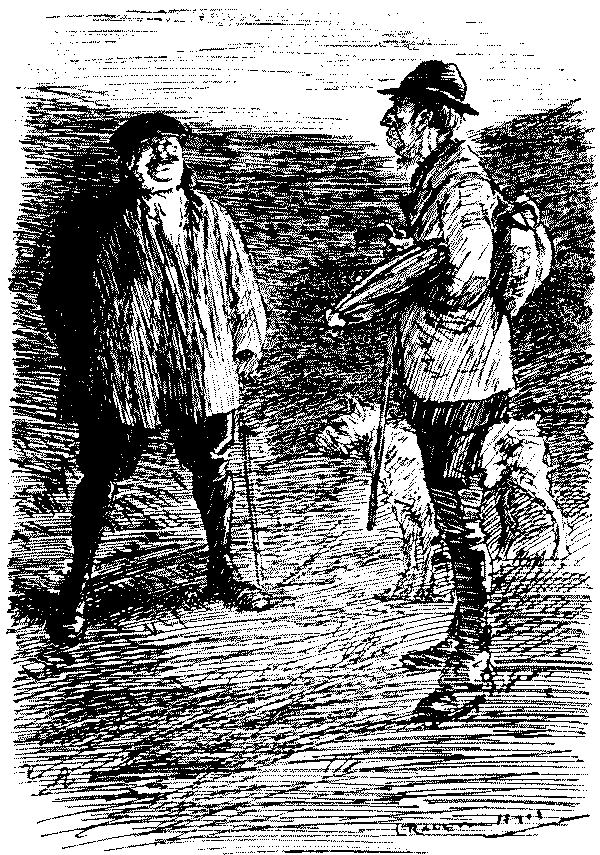
Stranger. "You must find it very lonely on these hills."
Shepherd. "Lonely? No, I don't. Why, there was a man an a 'oss passed yesterday, an' there's you to-day."
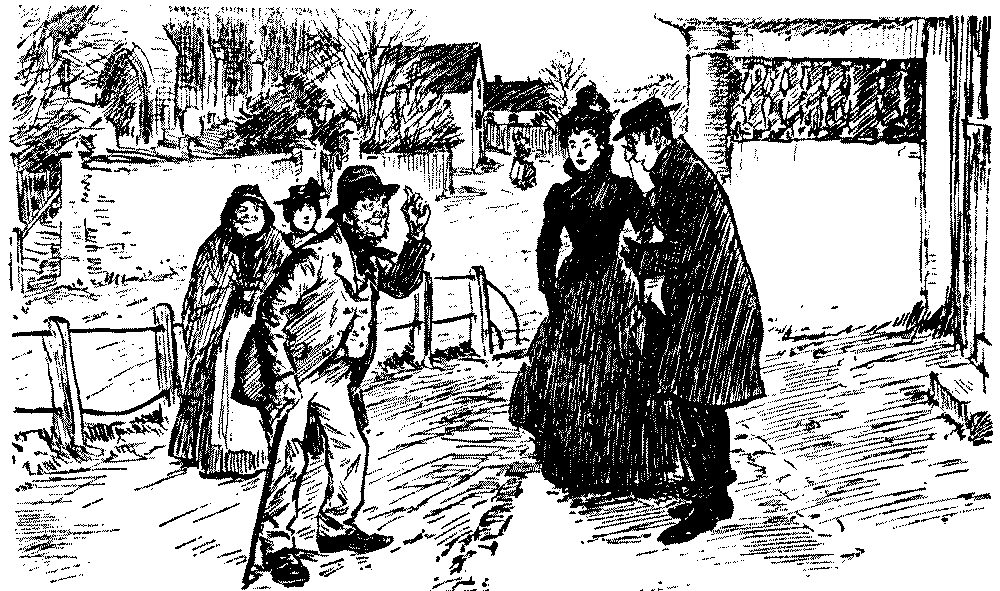
Agricultural Parishioner (wishing to ingratiate himself with the new curate, who had given a lecture on the previous evening). "Thank ye, sir, for your reading to us last night." New Curate. "Glad you liked it, John. I was a little afraid lest the lecture might have been just a little too scientific." Agricultural Parishioner. "No, bless you, sir, not a bit of it. Why, we in these parts be just like young ducks. We do gobble up anything!"

"None but the Brave deserve the Fare."—The Rector's Wife (at school feast, to one of the boys, who had been doing very "good business"). "What's the matter, Noggins? Don't you feel well?" Noggins. "No, m'm,—but—I'll hev—to be wuss, m'm—afore I give in!"
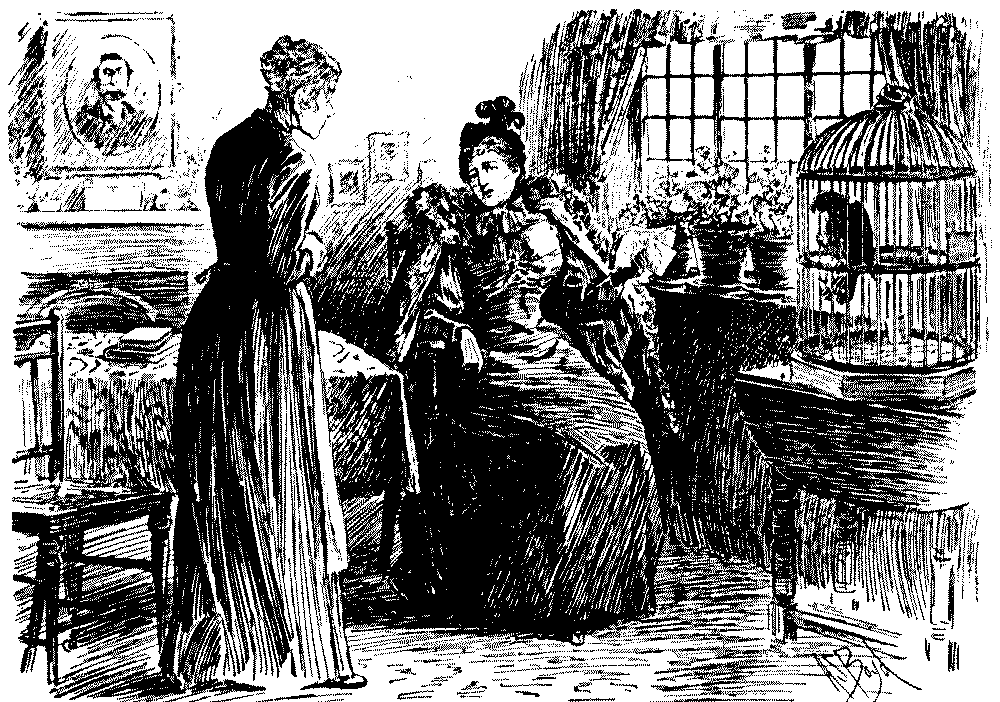
The Substitute.—The Rector's Wife. "Oh, Mrs. Noggins, I should really try to break your parrot of his habit of swearing in that awful way!" The Widow Noggins. "Well 'm, I finds it such a comfort to 'ear 'im. Makes it seem more like as if there was a man about the 'ouse again."
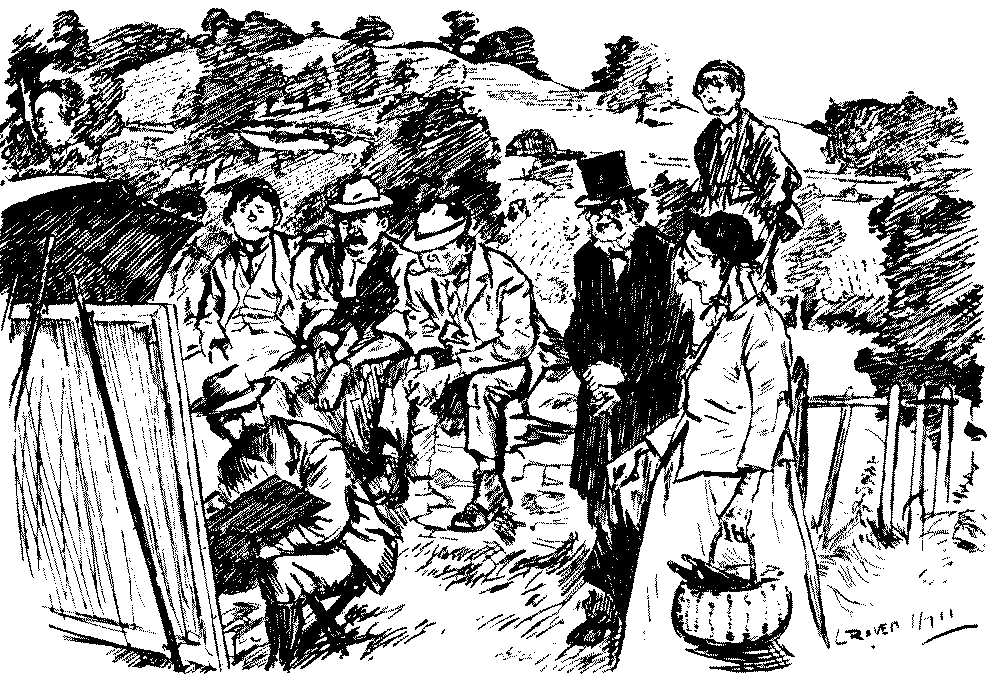
Village Dame (to eminent landscape-painter). "Law, sir, I do often wonder how you can 'ave the patience to bide here day arter day, drarin' an' drarin'! But, there, one thing, you 'aves plenty o' company!"
Boon Companions!—Bargee (to Rustic). "What! Ge-arge!" (Rustic grins in response.)
Bargee. "I'm allus main glad to see thee, Ge-arge?"
Rustic. "Whoy?"
Bargee. "'Cause I know there must be a public-'ouse close by!"
| Coaly-us. | Sinner-area. |
| Pet-you-near | Ah,-but-ill-us! |
| Peeler-go!-nyum! | Haughty culture. |
| Gee-rainy-(um!). | Ran-uncle-us. |
| Prim-you-la! | A-rum lily. |

Mrs. Ghoul. "Ah, funerals isn't what they used to be in my time! I recollect when we 'ad 'am sangwishes and sherry wine; but now it's as much as you can git a bit o' cake and a cup o' tea. Ah!"
Contentment.—Giles. "A happy New Year to you, marm, and I hope you'll be as lucky this year as I was last."
Lady. "Oh, thank you very much, Giles; but you surely forget that you lost your wife in the spring and broke your leg in the summer."
Giles. "Yes, but t'other leg's all right, and as for paw Soosan, it might have been I to be took instead."

Vicar (who has introduced "Gregorian" tones into his service). "Well, Mr. Rogers, how did you like our music? Tradition says, you know, that those psalm tunes are the original ones composed by King David." Flippant Parishioner. "Really? Then I no longer wonder why Saul threw his javelin at him!"

The Vicar. "I'm surprised at you, Miggs. Why, look at me. I can go into the town without coming back intoxicated." Miggs. "Yesh, zur, but Oi be so popular!" (Hic.)

Vicar's Daughter. "Oh, Mr. Gufling, I've called this morning to tell you that for the parish charities we open our most interesting show of local antiquities and curiosities, and may I hope that you will kindly give it your countenance?"
Customer. "You told me that 'oss 'ad won a dozen matches agin some o' th' best 'osses in the county. Why 'e can't trot a mile in ten minutes to save 'is life."
Dealer. "I didn't say 'e could. You never asked me what sort o' matches. It was in ploughin' matches 'e took the prizes!"